#can we stop creating conspiracy theories without evidence
Explore tagged Tumblr posts
Text
It wasn't even the tumblr staff disabling replies it was OP😭
No hate to OP but it makes no sense. If they wanted to censor tags they would have likely just censored anything with the keyword "Gaza" in it, catching the tag "free Gaza" mentioned in the post as well. The fact that it has less posts compared to the others doesn't really matter either, because this type of algorithms usually don't just decide what's trending based on volume of recent posts but by taking numerous factors into considaration.
Even though it's not outside of the realm of possibility, there is absolutely no evidence indicating that Tumblr is actively suppressing the tags at this moment.
Reblogs and replies got disabled, surprise surprise.
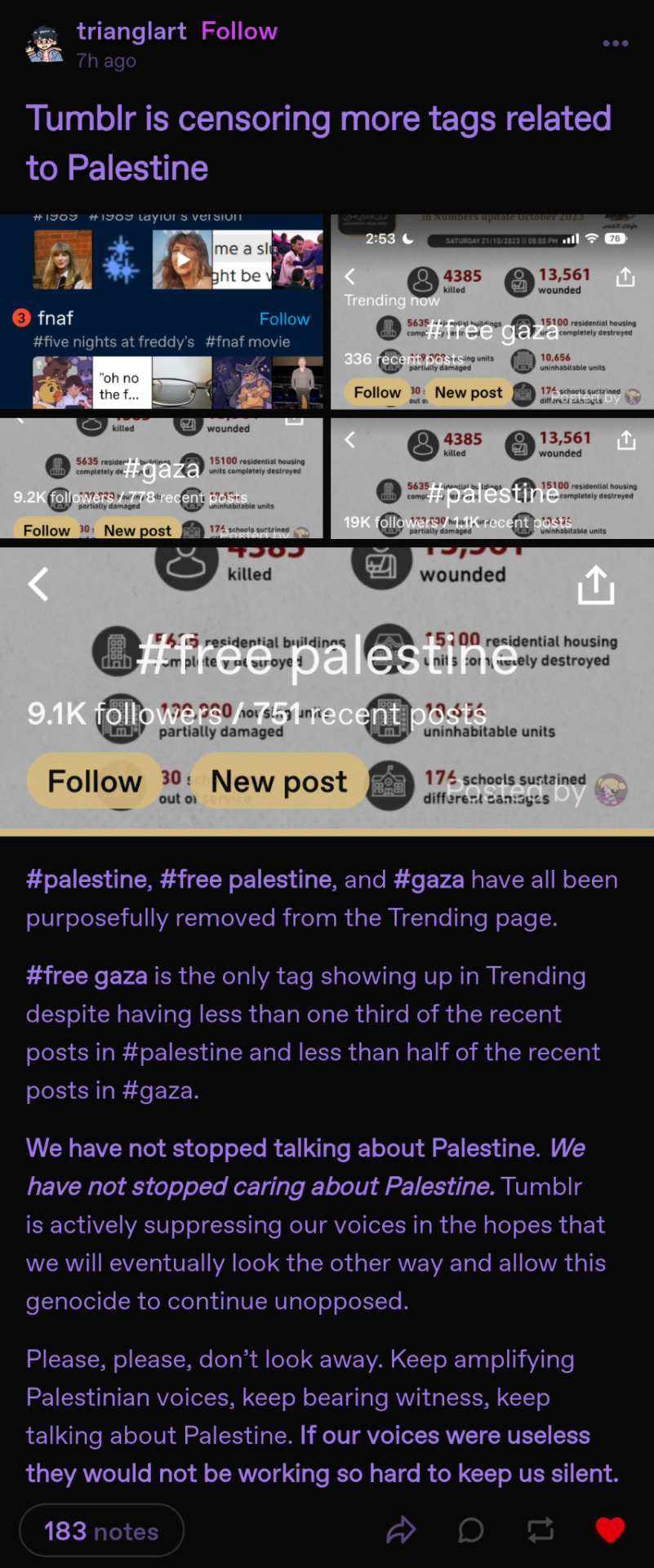
Reblog while you still can.
#i hate how easily misinformation gets spread on this site#honestly i dont care how much traction your post is getting#as soon as people point out you're wrong you should delete the post or at least edit a disclaimer in or something#can we stop creating conspiracy theories without evidence
26K notes
·
View notes
Text
Paranoia as a design process
“It's not doubt that makes you mad, but certainty”. Nietzsche

Critical-Paranoid Method, New York Délir, Rem Koolhaas (1978).
Paranoia is based on a type of thinking that redirects every fact to confirm its own biases. This is why the paranoid is always right. His distrust, inability to correct himself, and conviction are the ingredients for an activity that ties up all the details to confirm his conspiracy theories.
However, thanks to the ability to link unrelated events, and at the same time being diagnosed as a mental illness, paranoia was seen as a creative and refreshing new possibility.
Paranoia was an extraordinary way of stitching together the different realities that the early 20th century had to deal with. Dalí, dreamer of forms, was the inventor of a system based on this disorder which he called “the paranoid-critical method” (or MPC). He described it as "a spontaneous method of irrational knowledge based on the critical and systematic objectivity of associations and interpretations of delusional phenomena".
After we made all the possible logical associations, the critical paranoid method assumed the possibility of linking the impossible. So it was an invincible glue. It had a capacity of adhesion which made it possible to sew the background with the figure, the forms with their hardness or their textures, and the images with their shadows... However, unlike collage, the MPC has the power to make two ideas react different in explosive chemical reaction. Even the Cartesian and Corbusian criticisms could not serve as an extinguisher or a tame. It is therefore not surprising that it took so many years to apply it to architecture.
It was Rem Koolhaas, in 1978, who took it up in his book “Delirious New York” through this illustration of soft amorphous softness, supported by a wooden crutch. Dreamlike, absurd and unprovable conjectures had to be upheld with the stick of critical Cartesian rationality, according to Koolhaas. In reality, the paranoid critical method was a therapy for architecture and a way of reviewing one's own logic. Moreover, he avoided talking about consistency. It was like cheating "forcing a piece in a puzzle to fit, even if it doesn't."
“Through conceptual recycling, the consumed and spent content of the world can be recharged or enriched like uranium, and […] a simple process of interpretation will create an inexhaustible reservoir of false facts and evidence. invented” – Rem Koolhaas, New York Delirium, p.241
Of course, once the paranoia sets in, there's no one to stop these interpretations: wasn't that soft shape the concrete, and that wooden support the formwork? Or the relationship between enclosure and structure? Or the flowing Camembert that Dalí had stumbled upon in his fridge in the middle of the night, which struck him instantly and led him to create his famous painting “The Persistence of Memory”? Hence Dalí's double-image theory, which can be read simultaneously in at least two different ways, but which potentially only has a limit where the paranoid interpretation of the viewer ends. It is about the phenomenon which makes it possible to read a recognizable form in an abstract matter such as Dalí created with his melted watches, his canapes in lips or his deformed animals.
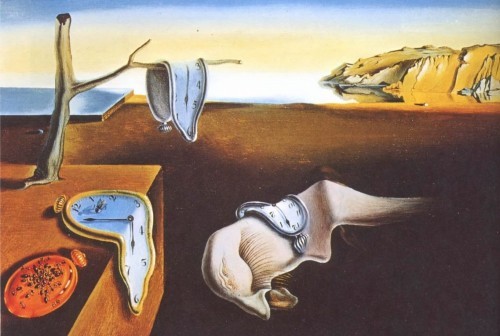
The Persistence of Memory, Salvador Dalí (1931).
The successes of the critical paranoid method seem almost forgotten today. Because today, it is difficult to explain certain contemporary works (Brandlhuber, Valerio Olgiati, Johnston Marklee and even Smiljan Radic) without seeing some of these paranoid critical gestures appear.
Therefore, when we see those brief nonsensical explosions or certain crazy things in a corner, we have to look closely, because it may not be the gesture of mere exaggeration or graceful forgetfulness, but the small chemical explosion produced by critical paranoid method.

Antivilla, Potsdam (Germany), Brandhulber+ (2014).

Pavilion for the Serpentine Gallery, London, Smiljan Radic (2014).
0 notes
Note
Do you have a link for the 'ouma isn't dead' theory? I want to reread it but can't find it. I absolutely love that theory but I always have a hard time remembering all the hints/evidence towards it.
Alas I don't have a very specific post of it (not anymore, or maybe it’s privated somewhere, or deleted, I can’t find it)- what I have is scattered pieces of evidence and general ideas of the theory everywhere and the kitchen sink
So to get a basic outline for mine at least, it’s basically:
Kaito plays a role in Ouma’s plan for the whole chapter- he helps co-ordinate a bunch of stuff that Ouma needs, and also keeps the group off his tail when they try to ask after him earlier on. To this end, he trusts Ouma enough to arrange and enact the Fake Crushing Plan(tm) and even help engineer his own kidnapping plot, among other things. Notice how cryptically he talks about the plan’s success to Shuichi, and obscures his relationship to Ouma when prompted by Kiibo to explain.
Kaito lies about the two items being crushed. Not only was the last Electrobomb way too useful to waste as a resistance item, the omni controller could not have been destroyed without freeing Monokuma from the trap designed to keep him away from the hangar in the first place (at least, such a thing would be pointlessly risky to do during this plot...)
Kiibo felt ill in the hangar due to the air- the reason had to do with something interfering with his systems, but in the JP text he was sure it wasn’t the Electrobomb causing that. A reason for that could be that he was sensing something in the air, however we never find out what it was that he sensed, just that leaving the hangar made him feel better (note: he is still within the Electrobomb’s range). The point being: perhaps a substance was used giving off a scent that he did not recognise and/or polluted the air, and that substance was coming from the hydraulic press.
Ouma used the Electrobomb in order to knock out the signal, to create the illusion that ‘the audience stopped engaging’. At least, the only established way to explain a sudden, timed blackout is an Electrobomb being used. All of this is so he can go underground - figuritively and literally - in order to mess up Monokuma’s master plan, that we don’t actually learn what it was in its entirety (due to missing bits of evidence- the nature of the ‘audience’ is a topic in itself, aha)
The long and short (without getting into all specific details of how they pulled it off- there’s... a lot to cover there): keeping Kaito as a possible ‘accessory-to-conspiracy’ in mind, and also a Danganronpa V3 script book that shows up in Chapter 5(?), the events of the plot may have gone down somewhat differently to what was said (Kaito’s a very good actor, so he’s capable of pulling it off, too)
I hope this helps! It’s an exciting thought, if hard to put down on paper entirely. I have a feeling some others may have gone through more particular details?
#checkered seer#replies#kokichi ouma#whew nelly.. had to cobble this together#i have this sneaking feeling I've done it before but forgotten#it's so hard to keep all ch5's details together haha#still miffed by the localisation thing just. all but destroying a vital clue#Sigh-#better head off for the night-#this consumed me today Hahaha#...darn i could have tagged kaito as well#idhgjhgfhkf no matter#Cosmic Envy#*edit: it's really Tsumugi who asks after him in this instance although Maki sort of-#-jumps on it as well#but yeah Tsumugi is pressuring a little :' )#V3's Theory of Vengeance
30 notes
·
View notes
Text
Incredibles Theory
Recently, I watched a video by Cartoon Conspiracy that theorized that Syndrome, was, in fact, a superhero - more specifically, the child of two supers. I highly reccommend you check it out.
More specifically, in the video, Cartoon Conspiracy theorized that Syndrome's parents must've been supers for the following reasons:
Mr. Incredible / Bob Parr seems to know Buddy Pine's mother well, if not both of his parents. As seen with the wedding scene where Helen and Bob get married, most of the attendees are, in fact, superheroes. This would suggest that Bob and Helen's majority of friends / acquaintances are also supers.
Buddy Pine, as a child, seems to be overly eager to become a superhero himself (and has access to advanced tech parts), idolizing Mr. Incredible, showing up at the scene of the crimes, inventing his own tech to give him "powers", and dubbing himself "IncrediBoy". For one, where exactly is Buddy getting all of the tech parts (as a child, no less) needed to make working rocket boots? And two, how exactly where, and when, to find Mr. Incredible multiple times, unless he also had a police scanner / some sort of device that notifies Supers when criminals are at large? (Or, perhaps more likely, he overheard his Super parents talk about where Mr. Incredible normally fights crime?) And why is Buddy the only "sidekick" we see or hear about? This could also potentially point to Buddy having one, or two, superhero parents, ones with access to government technology made for superheroes (i.e. Gazerbeam's eyepiece, gauntlets, etc.).
Buddy Pine seems to be obsessively fixated on "becoming a superhero", so much so that his entire childhood is spent revolving around becoming one, as well as his later adulthood. It seems strange that Buddy is the only "non-Super" featured in the film who wants to emulate a superhero in real life, whereas everyone else seems to be perfectly content with letting the established Supers (ones with powers) do the job of crime-fighting for them.
Forshadowing as related to Jack-Jack Parr, the child of two Supers, supposedly "not having any powers". In the film, one of the points that comes up is Helen Parr, a.k.a Elastigirl, worrying about (or at least noticing) that "Jack-Jack doesn't [seem to] have any powers". This is in spite of Jack-Jack being the child of two superheroes. So this tells us two things: one, that a superhero couple has had at least one child before; and two, that a "non-super" born to two supers has also happened before. Why else would Helen Parr / Elastigirl just seemingly accept so suddenly that Jack-Jack doesn't have any apparent abilities, even though he's still a toddler? ...unless, of course, there was a previous example that she knew of a "superhero couple's baby" turning out to be a "Muggle"...a child, perhaps, like Buddy Pine.
Syndrome's / Buddy Pine's later island base seems almost identical to the base of the Phantasmics, a team of superheroes mentioned in the extra of The Incredibles DVD. The Phantasmics were a super group part of the National Supers Agency, and focused on international threats. Their base, as such, is noted as a "Secret Mid-Ocean Location - Codename - New Atlantis".
Speaking of the Phantasmics, in the video noted by Cartoon Conspiracy, they were headed by team leader Everseer, whose superpowers included telepathy, clairvoyance, and "magni-vision"; Macroburst, a superhero with the ability to control air currents and create high-velocity winds; Plasmabolt, a female superhero whose powers involved shooting bolts of plasma, which was gathered from the insect-like antennae mounted on the head of her super suit; and Psychwave, whose powers included mental force wave generation, temporary mental paralysis, the ability to possess the bodies of others, psychic foresight, thought control, and telekinesis; her superhero uniform was notable for an atomic insignia. In the video montage of the Supers that Syndrome's Omnidroid kills in the film, the Phantasmics (Psycwave, Everseer, Macroburst) are some of the first superheroes to die by his hand.
Buddy Pine bears some physical resemblance to at least two potential Super parents. Cartoon Conspiracy theorized that Psycwave and Universal Man were the parents of Buddy Pine, because these two Supers appear first on his "kill list" (Project Kronos). However, personally, I think that Buddy Pine / Syndrome bears much more physical resemblance to the superhero Phylange, who had the ability to project sonic fields; and Apogee, a Super whose powers involved gravity control and levitation. Buddy Pine's facial / ear structure matches that of Phylange; his crooked teeth match Apogee's. Phylange and Apogee were both team members of the team "the Thrilling Three", along with...wait for it...none other than Gazerbeam. Likewise, Syndrome's Zero-point energy also involves what appears to be tech related to Apogee's gravity control / levitation ability.
Speaking of Gazerbeam, he seems to be, essentially, his presence seems to be the biggest piece of evidence in favor of this theory. According to The Incredibles DVD extras, Gazerbeam was originally a member of the Phantasmics, which would mean that he also worked with them off of their "secret island base" of "New Atlantis". (Sound familiar?) However, Gazerbeam's rivalry with team leader Everseer led to Gazerbeam's dismissal from the Phantasmics. After Dynaguy's death, Gazerbeam replaced him as leader of "the Thrilling Three", joining Phylange and Apogee in crime-fighting. In the film, Gazerbeam is also featured heavily somewhat, giving Mr. Incredible / Bob Parr the information on "Project Kronos" post-humously. However, Gazerbeam's previous involvement with the Phantasmics (and their "island base") seems too convenient to be merely a coincidence when it comes to his presence on Syndrome's island.
The "Thrilling Three"'s base seems based out of the same city from the intro. According to, again, the DVD extras, the Thrilling Three were based out of "the Trilling Three Towers...hours of operation effective by noon". (Again, why not start crime-fighting until noon, unlike the "around the clock" listed availability of other superheroes...unless one of the team had to take care of her child?) The Towers must've been based in the same city as Helen and Bob got married in, because Gazerbeam (a later Thrilling Three team member) also shows up at their wedding. Dynaguy, the current TT leader, also shows up to the wedding. However, the other two TT members, Apogee and Phylange, don't make an appearance. This could be due to the trouble their son (Buddy Pine) got into with Mr. Incredible only a short time before.
The only other "tech hero" seen in the film is Dynaguy, who, like Buddy Pine, had "rocket tech" to allow him to fly. Dynaguy, of course, used to be the leader of the "Thrilling Three", before his untimely death because his cape hit a snag on liftoff. Again, it seems too much to be a mere coincidence that Buddy Pine - who could be the child of two of Dynaguy's team members - apparently had the same, advanced "Super" tech Dynaguy had access to, albeit with Buddy reworking it into "rocket boots". Buddy even says to Mr. Incredible, "This is because I don't have powers, isn't it? Well, not every superhero has powers, y'know! You can be super without them! I invented these. I can fly! Can you fly?"
Buddy's / Syndrome's own dialogue as it relates to the Incredibles seems to indicate his own past. In the alternate opening on the deleted scenes, there's this really creepy moment after Syndrome hears baby Violet crying and then says to Bob, "You are breaking the law, Mr. Incredible. You know supers aren't supposed to breed," his eyes just slowly move in the direction of Violet's room. There's something very unsettling about that moment. Syndrome has Bob and Helen trapped with his freeze ray, and there's nothing they can do to stop Syndrome as he moves down the hall toward Violet. (Source) Likewise, Syndrome's decision to try and abduct Jack-Jack to "raise him as his own son" is disturbing in itself...almost like Syndrome has mental issues from his own abandonment / neglect as the child of a Super couple.
In addition to the last point, Syndrome's dialogue as he attempts to kidnap Jack-Jack is also very telling as to his own past:
Syndrome: "Shhhhhh.... the baby's sleeping. (chuckles evilly) You took away my future. I'm simply returning the favor. Oh, don't worry, I'll be a good mentor. Supportive, encouraging. Everything you weren't! And in time, who knows? He might make a good sidekick."
My theory as to what happened in Buddy's / Syndrome's backstory...
So, while Cartoon Conspiracy theorized that Buddy Pine is, in fact, a Super - having "super intelligence" - I am of the belief that Buddy, in reality, is not a Super. However, I agree on the point that he was born to two Super parents, just different ones from CC's theory: Phylange and Apogee.
Sometime before the flashback in the intro to The Incredibles, Phylange and Apogee had a son: Buddy Pine. However, being born to two superhero parents, especially during "the Glory Days", likely wasn't easy. When both of your parents' jobs involves dedicating themselves to a life of crime-fighting, where does that leave Buddy Pine?
As a result, growing up, Buddy's parents are frequently away on business. As such, he grows up looking up to, and idolizing, superheroes - and one in particular, Mr. Incredible. I think Buddy's obsession with Mr. Incredible started because, perhaps, he was neglected emotionally at home by his largely-absent parents. As such, Buddy decided to "latch onto" who he saw as a "perfect" father figure and role model - Mr. Incredible, who was an associate of his parents'.
As such, Buddy built up a "shrine" to Mr. Incredible in his house; "invented" his rocket boots; joined the Mr. Incredible Fan Club (or maybe even started it); and even tried to fight crime alongside Mr. Incredible as his sidekick ("ward"), "IncrediBoy". Having been emotionally neglected by his parents, he used this as a way to try and "become worthy" (in his eyes) of the attention and affection they never gave him. In his eyes, if he became a "Super", and "earned respect" as one, then his parents (as well as Mr. Incredible) might spend more time with / praise him.
Perhaps the case could've been that, because Buddy was born without any superpowers, he was more neglected by his parents, in his view, because "they expected / wanted a Super child". So, Buddy thought, if he could become a Super himself, then, perhaps, they might "love him more" then.
Indeed, TV Tropes says of a "Muggle born of mages":
He may be nice-if-pathetic or mean-spirited, but whatever the case, his bitterness and regret over not being a super is a major character trait.
If there's one thing that Buddy Pine / Syndrome seems to practically ooze, it's "bitterness and regret over not being a Super". He seems to always carry a chip on his shoulder because of it.
Buddy Pine / Syndrome particularly has three quotes related to the "absent parent narrative", particularly the "absent father" one:
"I'll give them heroics. I'll give them the most spectacular heroics that anyone has even SEEN!"
"See? Now you respect me, because I'm a threat. That's the way it works."
"That ship has sailed! All I wanted was to help you, I only wanted to help! And what did you say to me? (Flashback of Mr. Incredible: "Fly home, Buddy. I work alone.") It tore me apart, but I finally learned an important lesson: you can't count on anyone, especially your heroes!"
However, when Buddy Pine is rejected by Mr. Incredible, after the incident with Bomb Voyage, his anger and bitterness comes to a head. He decides that he "can't rely on anyone - not even his heroes", and, over time, becomes more and more hateful of his parents, and Supers in general. He sees them as people who deserve to be hurt - to be punished - and "just as they took away his future", he would "return the favor".
In time, Buddy Pine develops all sorts of tech, most likely taken from his parents' base. He likely goes to a normal university - probably a tech-related one - and is eventually hired by the government / National Supers Agency, possibly due to his parents' influence as (by-then-ex) Supers. He uses the government tech to create weapons of war and other technology, selling them to other countries for a huge sum on the black market.
All the while Buddy Pine works for the NSA, he gathers all of the intelligence he can on every Super, especially after the Supers go into hiding. Previously, the NSA required every superhero to register with them to fight crime legally, so naturally, they would have all of the Supers' information. Buddy Pine uses the government's task of "hiding" the Supers against them, and even his own parents.
However, despite the U.S.'s "Superhero Relocation Program", effectively ending the Supers, this isn't enough for Buddy. He begins plotting his revenge. Likewise, the Phantasmics are still operating internationally, not just in the U.S., off of their island base of "New Atlantis". Buddy, as part of the government / NSA, manages to get sent to "New Atlantis" as an NSA agent, claiming "he needs to do official government business".
So, Buddy scopes out the island, planning his method of attack. In the meantime, he finishes completion of the Omnidroid v.X1, and manages to lure the ex-superhero Universal Man to his death via it.
Not long after Universal Man's death, Buddy launches a surprise attack on the Phantasmics. (That, or he disguises it as an "NSA training session / meeting".) In the battle, Psycwave and Everseer are killed by the Omnidroid v.XI. Macroburst manages to take out the Omnidroid, only to be later killed by the Omnidroid v.X2. The last remaining team member, Plasmabolt, manages to escape the island, and is never seen / heard from again.
With the Phantasmics out of the way, Buddy takes over "New Atlantis", and makes it his base of operations as Syndrome. His next target - not surprisingly - is his own father, Phylange. Luring his father to the island, Buddy uses the Omnidroid v.X2 to kill him, obtaining the first part of his revenge.
After killing a few more Supers, Buddy moves on to his mother, Apogee, luring her to the island to kill her with the Omnidroid v.X4.
Meanwhile, former Phantasmics member Gazerbeam has been working as a lawyer. After being forced into hiding, Gazerbeam used his civilian identity to launch a campaign to get the ban on Supers repealed. Frozone commented that he "had trouble adjusting to civilian life," much like his best friend Mr. Incredible had. Also, Bob Parr (Mr. Incredible's civilian alter ego) had learned in a Metroville Tribune newspaper that Gazerbeam had gone missing. According to the newspaper article, he was last seen outside his apartment on Traction Avenue ten days prior to the date of the article. His past advocacy of Superhero rights—which had lead some citizens to believe that he had actually been a superhero—would have made him a likely target (especially to Operation Kronos, a plan set forth by super-villain Syndrome). (Source)
However, Gazerbeam had also been former team mates (and likely close friends) with Phylange and Apogee, Buddy's parents. After reading / hearing about Phylange's and Apogee's "disappearance", along with that of other supers, Gazerbeam does some extra research. He finds that Phylange, Apogee, and/or their son, Buddy, were last tracked to / seen on "New Atlantis", the Phantasmics' old base.
Thus, Gazerbeam, under the guise of being "recruited" for "Project Kronos", decides to do some undercover investigations. In time, he finds out the terrible truth - that Buddy Pine, his best friends' son, is now a meglomaniacal supervillain, and has been the one killing Supers - but that he's the next victim.
Likely being ambushed after finding out the truth, Gazerbeam has just enough time to swim to the underwater cave, and, using his abilities, carve the word "KRONOS" into the rock wall. By then, the Omnidroid catches and kills him, or he's already been mortally wounded.
And, from that point on, the events of The Incredibles happen as-is.
And, as a final kicker: the name "Kronos" itself is not only a reference to the 1957 movie [Kronos](https://en.wikipedia.org/wiki/Kronos_(film), but also to, in Greek Mythology, the leader and youngest of the first generation of Titans, the divine descendants of Uranus, the sky, and Gaia, the earth. He overthrew his father, Uranus, and ruled during the mythological Golden Age, until he was overthrown by his own son, Zeus, and imprisoned in Tartarus.
The period in which Kronos ruled was called the Golden Age, as the people of the time had no need for laws or rules; everyone did the right thing, and immorality was absent. Kronos learned that he was destined to be overcome by his own son, Zeus, just as he had overthrown his father, Uranus; thus, Kronos ate his own children, until his wife tricked him, and raised Zeus outside of his influence.
In the same vein, "Kronos" could be a reference by Buddy Pine himself to how he views his vengeance - with him as "Zeus", he used "Project Kronos" as a way to overthrow his father, Phylange (and his father figure, Mr. Incredible), "the most-well-known Supers of the Golden Age", even years after the Supers' retirement. And, just like how Zeus locked away all of the Titans (and Kronos) after their defeat to clear the way for him to rule as King of the Gods, Buddy / Syndrome kills so many Supers in order to clear the way for his "new world order".
After all...
Syndrome: [watching live news footage of the Omnidroid] "Huh? Huh? Oh, come on! You gotta admit, this is cool! Just like a movie: the robot will emerge dramatically, do some damage, throw some screaming people. And just when all hope is lost? Syndrome will save the day! I'll be a bigger hero than you ever were."
Mr. Incredible: "You mean you killed off real heroes so that you could pretend to be one?"
Syndrome: "Oh, I'm real. Real enough to defeat you! And I did it without your precious gifts, your oh-so-special powers. I'll give them heroics. I'll give them the most spectacular heroics anyone's ever seen! And when I'm old and I've had my fun, I'll sell my inventions so that everyone can be superheroes. Everyone can be super!"
Syndrome: "And when everyone's super ...[laughs]...no one will be."
122 notes
·
View notes
Text
Spark - 6
Fandom: Enn Enn no Shouboutai / Fire Force. Pairing: Shinmon Benimaru x fem!reader. Content: Denial. A glimpse into the past and into some hearts. Lack of proofing. A/N: Et voilá. Feel free to ASK or reblog for tag – in fact: always reblog <3 Thanks to those who have already <3
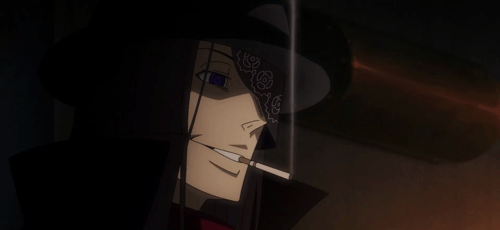
6. Ember
... Benimaru ...
Wet drops spray the face of the young captain of Company Seven, startling him back to the present where his friend and mentor waits. Konro is meticulously wiping his hands clean of soapy suds, the melancholic eyes hardened with stubbornness.
“What?” Benimaru sighs.
The senior takes his time to clean up the last thing in the kitchen before making them both a cup of tea, and even if Benimaru is getting impatient he knows better than to nag.
“You worry,” Konro finally states.
Yes. “Don’t know what you mean.”
“I’ve been trying to get your attention for several minutes. You’re worrying ‘bout [Y/N]...you don’t like that she’s on her own with Haijima and the Temple after her.”
“We don’t know if they are.”
The risk is huge, though, as rumours are circulating – and not just in Asakusa either: a few “leisurely” visits to bars in neighbouring districts had quickly payed off in the form of whispered gossip. And yeah, the people Benimaru had overheard were all civilians but his distrust of the governing bodies fed into what some would consider conspiracy theories.
“...and I don’t worry.”
Simply smiling knowingly, the older man sips his tea and allows the silence to become the answer. Faint notes of jasmine and camellia cocoon them in an attempt to create a fragile, peaceful bubble. Under normal circumstances that would work. This time, however, one of them men remains jittery, his mind losing a battle against unwanted concerns.
“Why would I even worry? You’ve no reason to think that.”
Konro tries to smother a laugh. “I’ve known you since you were a kid, Beni,” he snickers, “and in all that time I’ve never seen anyone get you as riled up as she does.”
“That’s ‘cause she’s infuriating!”
And she is. Uncooperative, stubborn, reckless, unpredictable, strange, intriguing, resourceful, charming (to those she likes). Fuck. Loath to admit it, the captain has to accept that the list of adjectives would be filled with increasingly positive traits if he were to continue trying to define the woman.
It hardly matters, though. It’s been almost a week and despite the rumours flourishing beyond Asakusa, there hasn’t been a single tangible bit of evidence that [Y/N] is still roaming free somewhere. Maybe, she’s taken his warning seriously and done a proper job at hiding this time, but the risk is great that she’s been caught by either of the authorities for testing.
They’d see her as a blank slate. Someone who clearly has some pyrochinetic ability latent, waiting to be triggered and possibly shaped to fit the needs of the situation in which it arises. She’d be an experiment. A test subject bombarded with horrors until either Haijima or the Temple accomplish what they want...or dispose of her as a failure.
“Listen,” Konro tries to appease, “I don’t want her falling into their hands either and I’ve got both eyes and ears open. Maybe we’ll find her in time.”
... Reader ...
Staring at the paper in your hands, the writing blurs in comparison to the picture of two men with attempted smiles – one of them is holding a framed photograph of a pair of sisters, the other father clenches a plushy. Even if the scene is monochrome you know the singed, floppy ear of the toy rabbit is purple. It’s the stiff way they sit that call forth tears which you angrily wipe away. It’s their eyes focused beyond the camera, at whomever choreographed the whole thing from the way they sit to the text which you still haven’t read. You know it’s not the men’s words anyways, despite what the text claims.
“W-where’d y’get this?”
You hate how shaky your voice is. Hate the slight wince that not even the Joker can hide.
“Let’s just say I’ve got...friends in the right places.” The hesitation is obvious to anyone with trust issues, but you decide not to dig into it. “Don’t worry...daddies are still at home, nice and safe and under surveillance in case you show up.”
How? You’d purposely stayed away for more than a year after having seen them through the anguish of rebuilding a life with both daughters gone. Staying away from the neighbourhood and all the places you knew they might frequent...and still they’d been dragged into a manhunt without knowing half of what was going on. Or do they? No. Haijima and the Temple would tell them a lie, that much is clear from the few lines seeping into your consciousness from below the picture. ‘Kidnapped’, ‘vulnerable’, ‘return her home’, ‘reward’.
“Tell me,” your strange rescuer puffs, “why are you so keen on not getting caught by them? They could help you with your powers.”
You suppose it’s a logical question, one that aligns with the plan you’d come up with once the initial panic and concern had faded away during the first weeks alone:
Squeezed in between the dumpsters, you could only see glimpses of the third special fire force company’s battle against the infernals. You could hear the burning screams; wailing, high pitched, cursing the living while craving their souls. One by one, the fiery beings were extinguished. Latôm.
But your legs were shaking too much for you to crawl out of your hiding spot and all you could do was sit and try to breathe. In and out. Thoughts swirled in your head, obscured by a different kind of smoke, and it was the dry voice of one from the third company that brought your attention back to the world:
“What a shame,” he complained in a hush to another, “I was sure it would work this time.”
“More tests,” was the curt answer, “the more we discover and get control over, the closer we’ll get.”
The words held little meaning to a scared teenager but you understood – no, you wanted to think – they were trying to find a way to stop infernals from appearing.
“The faster they combust, the sooner we can find a new Atolla. Burn the place down.”
“Until then...we managed to get those,” the second consoled icily and you saw his shadow point to two children.
Frightened, crying snot so hard that one of them is hiccup’ing, it was clear they didn’t want to be a part of whatever the men were talking about. The first man, wearing a high hat and glasses over a bird-like mask, bend to look at them, giving you the impression that he might as well have been scrutinizing the craftsmanship of a woodworker rather than human beings.
“They won’t be missed?” he inquired.
It seemed to amuse his friend. “Missed? Who’d miss sticky little maggots like these? Besides, it’s for the Cause.”
A few days later, you saw the red-eyed mother handing out homemade pamphlets with description and picture of one of the children.
A week after that, you saw the kid holding on tight to a hand as they walked down a busy street. Not tight enough, though. The boy cried out in distress at being abandoned at first until the confused sounds morphed into screams of agony as flames sprouted from his eyes, arms, body. As you fled the scene, you could have sworn you saw the masked man retreat into an alley.
“I don’t know much about them, but I don’t trust them. They hurt kids. People.”
The Joker pins you down with a long stare of the crazy eye. “Let’s hope you never find out for yourself.”
#Shinmon Benimaru#Benimaru x reader#enn enn no shouboutai#Benimaru fanfiction#Shinmon Benimaru x fem!reader#Shinmon Benimaru fanfic#fire force benimaru#Fire force#benimaru shinmon#Benimaru slow burn#enen no shouboutai#Benimaru#x reader#Spark 6#fanfiction#fanfic#writing#WiP#Benimaru angstish#Benimaru protective
84 notes
·
View notes
Link
According to the World Health Organisation, the first case of COVID-19 was confirmed in the Philippines on 20 January 2020. More than a year after, there are now more than 600,000 confirmed cases, nearly 13,000 deaths and a surge of 5000 new cases in one day. Approximately 41 percent of the total number of confirmed cases are from the National Capital Region (NCR), where Manila is located. The death toll from Duterte’s Drug War since July 2016 ranges from a conservative estimate of 8,663 people according to the UN Human Rights Council, to possibly thrice as high based on statements from the Philippine Commission on Human Rights. The official record from the Philippine Drug Enforcement Agency (PDEA), the agency implementing Duterte’s Drug War, is at 6,011 deaths from July 2016 to December 2020.
Alarmingly, the national pandemic response is even being harnessed in the service of the Drug War with extrajudicial killings registering a 50 percent increase between April and July 2020. Both COVID-19 related deaths and extrajudicial killings linked with the War on Drugs have been popularly represented by the Duterte government as disconnected from, or outside of, all the range and repertoires of repression at the state’s disposal.
Yet prior to the pandemic, Filipinos were already primed for and inoculated to mass loss of life and human rights violations, precisely because of the militarism that has been the logic of security under Duterte’s rule. We can understand everyday life in the Philippines as part of an ongoing continuum of violence, from the first day that Duterte launched his war on drugs, to the present militarised response to the health crisis. The Philippines was already suffering a ‘murderous plague’ which made death paradoxically both an abstract and visceral reality for many Filipinos, even before the disease outbreak.
It matters, therefore, that we constantly articulate how tragedy and mass loss of life are routine and logical outcomes under Duterte and why this government must be made accountable for the murderous plague it has authored. Filipinos must maintain their demands for better leadership, crisis response and management despite the persistent gaslighting by the President, his spokespersons, and enabling members of his regime. The forthcoming May 2022 national elections have prompted discussions on the importance of leadership among specific sectors mobilised by the question, ‘pangulo’ or ‘pang-gulo’ (‘president’ or ‘nuisance’)? At the highest level of power, does the Philippines have someone who leads, or someone who self-servingly obstructs recovery and fuels division?
Drug war and the limits of militarised security
Duterte’s default approach has been to wield the military and police at every crisis. However, this approach generates its own crises because the truncated lens of militarism comes up inadequate in addressing the multidimensional root causes and consequences to much of the global security challenges we are facing today. Based on the best available science, and what COVID-19 is demonstrating globally, state leaders must be able to address a drastically changed security landscape where the heightened intensity and frequency of extreme events will threaten all areas of human life and ecosystems. What has been undeniable is that leaders disastrously fall short of managing crises—whether in the context of armed conflicts, disasters and climate change, or health pandemics—when they do not incorporate a range of perspectives and expertise.
Duterte’s military and police-driven approach to every national decision-making process is exclusionary. He has sought to frame Filipinos, especially frontline health workers who express their discontent, as ‘enemies’ who do nothing but complain. Because he reproduces and invests in militarising crises, he cannot but interpret differing views as an existential threat to his power. The Philippines therefore has a leader that forecloses spaces for civic deliberation and participation at a time when these are most needed.
The drug war has gradually created the institutional and rhetorical foundations that enable other forms of violence: the use of Anti-Terrorism Act of 2020 and ‘red-tagging’ to silence opposition; the compounded suffering of internally displaced communities as resources are diverted away from the forgotten crises in Marawi and Tacloban; and ongoing violence and development aggression against Indigenous peoples and environmental activists. Duterte’s war on drugs has been argued to satisfice the stages of genocide.
Death and disinformation due to ‘infodemic’
The pandemic is also mediated by a pervasive climate of disinformation in the Philippines. The deadly combination of militarism and disinformation has been effective in fragmenting and eliminating political opposition, and in state repression more generally. Over the past years, Philippine democracy has been constantly threatened and undermined by the rapid and increased production and dissemination of misinformation and disinformation. A study has shown how insidious, partisan and curated content is produced and circulated by “architects of networked disinformation”, including influencers, online celebrities, politicians in-house team’s, and marketing companies. These players have weaponized the internet to support and bolster the operations of Duterte’s administration in designing and implementing a political and militarist agenda.
An evident outcome of weaponizing social media platforms is the silencing of dissent. Paid trolls, bot armies and a range of fake news websites run by supporters of Duterte have targeted and harassed individuals and institutions. For instance, in 2018, Maria Ressa, the chief executive of Rappler, was the target of state-sponsored “patriotic trolling”, misogynistic comments and hate speech. Meanwhile, the Philippine government attempted to revoke Rappler’s license in 2018. Notably in 2020, Philippine lawmakers rejected the franchise renewal for ABS-CBN, a Philippine’s broadcasting company also critical of Duterte’s governance.
Misinformation and disinformation also impact the lives of ordinary Filipinos in national and transnational contexts. A report shows that Filipinos spend an average of 4 hours and 15 minutes each day on different social media channels. These online platforms have also been used to sustain ties among overseas Filipino workers (OFWs) and their families. For the ten million Filipinos spread across the world, social media and mobile applications have become valuable tools to remain connected to home. However, these channels serve as key sites for producing and disseminating fake information. For example, a study on the 2019 Philippine election shows how OFWs are targeted by online communities that disseminate falsehoods and manipulative content.
More recently, an ‘infodemic’ has emerged in tandem with the COVID-19 pandemic. The spread of hoaxes and conspiracy theories about COVID-19 and attacks on the credibility of the World Health Organization (WHO) re-victimises all those who have died in the pandemic and the families they have left behind. In a digital environment muddled by falsehoods and inaccuracies, people are afforded narratives that only validate their own pre-existing beliefs and affirm experiences that reflect their immediate or narrow environment. This makes it all the more possible for those in positions of power and privilege to detach (and stay out of touch) from the harsh realities millions of Filipinos are facing.
The use of digital technologies at a time of crisis can stir heightened ambivalence among Filipinos. On the one hand, greater online connectivity affords the maintenance of intimate ties transnationally. However, it is the same connectivity that can potentially be used to distort understanding of social welfare, human rights, and personal and familial futures through the lens of fear. Akin to the pandemic, widespread disinformation is slowly but effectively killing mutual trust and civic participation in Philippine society. It does this by eroding Filipinos’ access to reliable information and their right to thrive in democratic spaces. Crucially, disinformation hinders Filipinos from seeing the structural inequalities, marginalisation and exploitation that implicates us all. There is neither one person nor a “silver bullet” that can magically vanquish—in six months—what has been built over decades by political and economic systems in the Philippines. It will take care, collective action and mutual responsibility.
Stop the killings; stop the strongman
Crises can provide windows of opportunity to overhaul ossified harms done by this government, and repair what good is left. Deaths and killings may be mundane now but they do not have to be acceptable: not now and not in the future. There is a need to develop antidotes that can reclaim, secure and protect democracy. As the COVID-19 pandemic intersects with Duterte’s murderous plague, Filipinos are faced with clear lessons that can be brought to bear in the next election.
First, there is no path to “rapid” recovery and it takes inclusive governance and leadership to realise long-lasting and “crisis-proof” reconstruction. Moving forward, Filipinos might be more sceptical and suspicious of leaders promising to do everything without demanding shared responsibilities and recognising diverse expertise from the Filipino public. Globally, we are also seeing youth-led protests both from afar such as in the US, and closer in neighbouring Thailand and Myanmar, against police and military violence as well as outdated styles and systems of militarised authority. While their rule may seem inescapable at present, young people are taking the lead in sending a clear message: the myth of the ‘strongman’ is no more.
Second, the killings were indirectly enabled by the political fragmentation and societal division accelerated by digital technologies. What proved most effective in stifling collective action was the framing of political engagements in terms of “camp” politics and loyalties—us versus them / DDS versus Dilawan—instead of under a unifying identity of “the Filipino people.” Duterte’s success in fulfilling an initial populist desire for a ‘strongman leader’ is an outcome of previous failures in crisis response under the Aquino government. Rather than see Duterte and Aquino as oppositional, we need to see the violent continuity between the two different models of leadership.
Third, the rise and resilience of Duterte’s strongman rule is connected with his leveraging of underlying sexism, misogyny, class and regional prejudices in Philippine society. Clearly, Duterte’s misogyny is no laughing matter. Rape jokes are neither humorous nor harmless. His speeches form part of, and feed, societal violence. Finally, the path to stopping the killings will be long and difficult, but necessary. The governance challenges ahead will be more complex and difficult. An indispensable step in this direction is recognising and healing from collective grief on a transnational scale. Then the task of refocusing energies toward building new leaders and political agendas can begin.
27 notes
·
View notes
Text
Understanding Qanon

Both left and right politics have seen surges of conspiratorial thinking, but without question the most organized and politically salient conspiracy theory at the moment is Qanon. In The Atlantic, Adrienne LaFrance dives deep into Q and its context.
https://www.theatlantic.com/magazine/archive/2020/06/qanon-nothing-can-stop-what-is-coming/610567/
As comprehensive as LaFrance's account is, there's one blank spot: why is belief in conspiracies is surging in the first place?
The main explanation - a subtext running through LaFrance's excellent piece - is that algorithmic persuasion is to blame.
That is, the systems that Big Tech built to convince us to buy refrigerators and acne cream are now being hijacked to convince us that pizza parlors are harboring pedophile rings in their (non-existent) basements. I am very skeptical of this account.
First, because the best evidence we have for Big Tech's power to perform these persuasive miracles comes from Big Tech's own marketing puffery, what they tell potential advertisers to justify their rate-cards, and what they tell investors to buoy their share prices.
Neither the source nor the claim is particularly credible. If there's one thing we know, it's hard to convince people of stuff. That, in fact, is the hard problem of advertising, religion, politics, art, and social change. No one has systematized it in an enduring way.
What Big Tech does VERY well, however, is find people. It can find people who are thinking of buying a fridge (a diffuse, hard-to-locate cohort) by targeting people who've shopped for fridges or kitchens, or perused reviews. This isn't a persuasive miracle, it's just spying.
Likewise, Big Tech can help people with fringe ideas locate each other. This is true irrespective of how much you like those fringe ideas: it doesn't matter if the idea is #BlackLivesMatter and gender is a spectrum or white nationalism and the Earth is flat.
I believe what we call "persuasion" is primarily "targeting." If the major barrier to the spread of your message is that you can't find the people who would be receptive to it, Big Tech's people-finding systems can supercharge your ideas.
This works especially well for ideas that invite social disapprobation if you publicly embrace them - which is why the internet is such a godsend for queer kids who fear discussing their sexuality with intolerant friends or parents.
It also works great for conspiracies.
Which raises a different question: why is it so easy to find people who want to believe in conspiracies. My answer: because so many of the things that have traumatized so many people ARE conspiracies.
The opioid epidemic was a conspiracy between rich families like the Sacklers and regulators who rotate in and out of industry. The 737 crisis was caused by Boeing's conspiracy to cut corners and aviation regulators' conspiracy to allow aerospace to regulate itself.
Senators conspire to liquidate their positions ahead of coronavirus lockdown, well-heeled multinationals conspire to get 94.5% of the "small business" PPP fund, Big Tech conspires to fix wages with illegal collusion while fast food franchises do the same with noncompetes.
In a world of constant real conspiracy scandals that destroy lives and the planet, conspiracy theories take on real explanatory power. This is beautifully discussed in Anna Merlan's 2019 book, "Republic of Lies."
https://boingboing.net/2019/09/21/from-opioids-to-antivax.html
All of this is the context for Qanon. Add to that the fact that Q is also a literal industry whose superstars make fortunes - and not necessarily cynically, because, after all, what better proof could you ask for of the truth of Q than the fact that it's making you rich?
Another consequence of making it easier to find people is that groups can coalesce around loosely defined principles. Pre-internet, the high cost of group-forming meant that you would be wasting a lot of effort by grouping with people who disagreed with you on fundamentals.
Eventually, those disagreements would drive you apart and all your group-forming work would be wasted. But lower-cost group forming makes it easier to take risks on making common cause with people you disagree with.
People who criticized Occupy for the lack of a crisply defined program missed this point: by refusing to narrowly define its cause, Occupy could be a broad tent.
Q's gnomic utterances are perfectly suited to exploit this increased appetite for risk in group forming.
Q's nonsensical utterances become an oracle that different kinds of conspirators can project their own fears and aspirations onto, creating multiple, irreconcilable interpretations for these pronunciations.
And that very vagueness and imprecision allows Q followers to find post-facto interpretations that show that Q was right all along (a favorite pastime of mystics from Revelations to Nostradamus).
Q is both a rehash of historical conspiracy pathologies and utterly of this moment, then. It's a phildickian phenomenon, a conspiracy whose gospel reads like the cryptic notes I get from stalkers who are having terrible, paranoid hallucinations.
Q is both a rehash of historical conspiracy pathologies and utterly of this moment, then. It's a phildickian phenomenon, a conspiracy whose gospel reads like the cryptic notes I get from stalkers who are having terrible, paranoid hallucinations.
One of the milestones in my understanding of conspiracists was this outstanding interview with a leading Flat Earther by the Oh No Ross and Carrie podcast:
http://ohnopodcast.com/investigations/2018/7/20/ross-and-carrie-traverse-flat-earth-part-7-the-jeran-campanella-interview
He describes his satisfaction with Flat Earth as compared with other conspiracies.
By which he means that the community bonds and his ability to have high stature in it are satisfying and that makes it feel true.
These feelings, along with the trauma of real conspiracies, make conspiracism a powerful temptation. That should guide our thinking on Q.
Not the junk science of the nonreplicating, discredited "backfire effect" (which is a polestar for Facebook's approach to conspiracy despite its lack of rigor):
https://pluralistic.net/2020/05/14/everybody-poops/#backfire-effect
Meanwhile, if you want to get deeper into the bizarre mythology of Q, I highly recommend this "Qanon exit briefing."
https://violentmetaphors.com/2018/12/04/your-q-anon-exit-briefing/
269 notes
·
View notes
Text
Saviors in a Half Shell 5
“Let me get this straight. You guys were the ones who really saved the city? Twice?”
The commotion had made national news headlines for weeks years ago. The most recent occurrence was five years ago, way before Y/N had made her way to the city.
It was the sort of thing that led to many online conspiracy theories, but none of them had any solid evidence. The media led people to believe it was a man named Vernon Fenwick, who had subsequently called himself ‘the Falcon’.
How obnoxious.
“We knew we wouldn’t be accepted by the general public, and he just so happened to be working with us- it made sense,” Leonardo shrugged.
“People are so gullible,” she snorted. She shook her head. “Even I had a feeling he couldn’t have taken that thing down without help. I mean, one man? Unless it was dumb luck. I’m still trying to understand why someone wants to take over a city. A single city. What, turn it into his kingdom? He knows there are bigger and better cities out there, right?”
“Bigger and better? Oh, man! We have been so busy saving this city, we haven’t been able to finish our hip-hop Christmas album!” Mikey couldn’t have sounded more pitiful.
Y/N laughed. “I’d love to hear you guys try to rap Silent Night. Ninjas and all.”
Right as Michelangelo opened his mouth to give her a proper demonstration, he was pushed over by his red-banded brother.
“Someone’s a party pooper.”
“I just spared your eardrums,” Raph said, looking quite pleased with himself.
“What a sweetheart,” Y/N said through a snort. These guys were definitely brothers, the way they treated each other.
“Speaking of sweethearts,” Mikey grinned. “What are you going to do now? Now that you know us and all. You gonna stay here for good?”
“Mikey-” Raph growled.
Y/N just shook her head. “I have an apartment in Brooklyn I should probably get back to at some point. And a job.”
“Do you think you’re ready to get back to all that?” Leonardo asked her quietly. He still wasn’t sure what pushed you so far towards the edge- depression, that was pretty clear. Was there a more specific reason?
She shrugged again. “Have to sooner or later. It comes and goes. Good days, bad days, you know?” She looked around the room with a small smile. “Plus, if I go back to… All that, and I feel like it’s all going down the drain again- well, you guys make a mean cup of tea.”
The brothers looked between each other. It was obvious they all felt some type of way to hear that she was leaving. They had known this woman for less than twenty-four hours, and yet the thought of her leaving them left them feeling empty. She was one more human that accepted them for who they were. She didn’t run, she didn’t scream, she just accepted it.
“I took the liberty of adding our numbers to your phone,” Donatello said finally. “In case you ever need us for any reason.”
“Need a cup of tea, an escape, a friend-”
“-Boyfriend-” Mikey cut in.
Raph wasted no time knocking him over completely this time.
“I don’t think I could handle you, Michelangelo,” Y/N gave him a small smile. “You remind me of me when I was younger.”
Mikey got to his feet, dusting off his thighs. “How old are you again?”
She grinned. “Twenty-one, legal drinking age.”
He shook his head in confusion. “We’re older than you.”
“I really can’t thank you guys enough for this,” Y/N said, ignoring Mikey’s statement. “Especially you two.” She looked between Raphael and Leonardo. “Especially you two. And the Thai food of course.”
~
It felt like it had been an eternity since she left. It was almost dusk, it had really only been hours. Donatello gave her an extremely detailed map of the sewers, including the streets they followed, in case she wanted to come down by herself. They all figured she’d just ask for an escort, but in case she didn’t feel like it.
“And as soon as she comes into our lives, she leaves,” Michelangelo said through a dramatic sigh. “Do you think she’ll be okay?”
“She’ll be alright,” Donatello said. “I added multiple suicide hotlines and therapists to her phone when I added us.”
“She can’t just stay here forever,” Raphael grunted. “She lives up top, she belongs up there. April and Casey don’t live their lives down here with us, do they? No, they live up top with the other humans.”
Leonardo stayed quiet. They were right- she belonged up there with the other humans. She had a job, an apartment, a life- they were just four turtles that lived in the shadows. They saved her from a mistake she couldn’t go back from. What she did now was up to her.
“Maybe we should check on her tonight!” Mikey said, disrupting Leonardo from his thoughts. “Don, you got her address, right?”
“You think I’d let her leave without knowing where to find her? Do you even know me?” Donatello let out a ‘pfft’. “I have her address, her workplace, her social media profiles.”
“Isn’t that going a little too far?” Leonardo said.
“It’s all for her safety!” Mikey argued, even though the question obviously wasn’t pointed towards him.
Leonardo sighed. “Fine. We can check on her tonight.”
He tried to convince himself it was for his brothers’ sake.
“Since you did all that research on her, might as well not put it to waste. Whadoya got, Donnie?” Raph asked as he plopped back down on the couch.
Donnie pushed up his goggles, more for effect than anything. They were quite literally strapped to his head. “According to all of her profiles, she was born in Iowa and moved here a year and a half ago. No listed family members. Says here that she works for herself, doesn’t say what, but I’m seeing a portfolio right here with a bunch of different headshots.”
Mikey made his way over to Donnie’s corner, squinting at the screens. “Maybe she’s a professional photographer. Do you think she could shoot the music video for our Christmas album?”
“I have a feeling it’s more of what’s in the picture that is her job,” Donnie said slowly. “My money’s on makeup or hair.”
“What do you know about that stuff?” Raph questioned.
“Hey, if it was a photography portfolio, you’d definitely see more variety than just heads,” Donnie replied, rolling his eyes.
“Too bad we don’t need a new hairdresser,” Raph snorted, running his hand over his bald head. “Alopecia right here.”
“We’re turtles, we don’t grow hair in the first place.”
“It was a joke, Don.”
“It wasn’t a very thought out joke.”
By that point, Leonardo was no longer paying attention to his brothers. He was no judge of skills with hair, but these pictures didn’t look half bad. Maybe he needed to pay attention to pop culture a bit more to understand. Was she dissatisfied with her work?
She hadn’t mentioned a roommate. He figured she lived alone. Leo recalled April saying how expensive it was to have your own apartment in any part of New York. She couldn’t have been that bad at her job to be able to live on her own.
His thoughts were disrupted when he felt his phone buzz.
Miss me yet? - Y/N
He frowned, looking down at the screen. It had only been hours.
You guys seriously messed up my sleep schedule, I’m wide awake and it’s almost nine at night. - Y/N
Oh yeah? Almost time for us to get to work - Leonardo
Ah, the night shift. Latest I’ve worked was probably until two. I didn’t want to even think about waking up the next morning. - Y/N
You work that late? - Leonardo
I had no idea this client was going to take me eight hours. We were almost sick of each other by the end of it. - Y/N
Maybe Donnie was right. He had no frame of reference for photography, but that seemed late. Did hair related things take that long?
I’ll let you get back to work. Maybe you’ll even save another damsel tonight. - Y/N
Let’s hope I don’t have to - Leonardo
He wasn’t sure his brothers could handle two humans in twenty-four hours. Mikey would go crazy.
“Leonardo? Earth to Leonardo?”
He bounced back into reality. “What did I miss?”
“Um, our entire conversation?” Mikey said, poking him on the shoulder. “It’s your head that’s in the clouds today.”
He sighed. “What, then?”
“April says she has a lead on the Purple Dragons,” Donnie said, turning towards them. “They’re hitting several spots tonight. We need to get going.”
“Alright, you know the drill,” Leonardo said loudly. “What are we waiting for?”
He didn’t have to ask twice.
~
Meanwhile, Y/N was settling back into her apartment. She regretted leaving it in such a mess the night before. It had taken her until now to finally get it straightened up enough to have company.
Not that she was expecting company.
She let out a small sigh as she placed a mug of tepid water in the microwave. She briefly recalled the events that ensued in the past twenty-four hours.
She did not wake up yesterday thinking she was going to get that close. It had taken all of her courage to even stand on that ledge. Heights were not her friend, ever since she was a child. Maybe it wasn’t the fear of heights so much as it was the fear of falling.
It didn’t make sense that it was her chosen method.
She shook her head quickly. No, those were not the kind of thoughts she needed. Not this soon.
Truth be told, it was hard to live in a city such as New York. It was so easy to get carried away with the hustle and bustle the city was known for. Even on her daily walk to the shop, she felt like a tiny speck in the big picture. Nobody gave her a smile, nobody even looked at her. It wasn’t what she was used to.
Hell, back in the Midwest, people smiled at strangers as they passed them on the road. They waved to people driving tractors, and were even pleasant if one was going ten miles per hour. But here?
If you so much as stopped on the sidewalk, you were given death glares and knew people wished you didn’t exist in that moment.
Maybe she wasn’t meant to stay here.
It was almost every hairstylist’s dream. If you could make it in New York, you really made it. It was a cherry on top if you ended up catering to hair shows, took on a sponsorship for various brands. If you made it in New York, you could even create your own line of color and hair products.
Two and a half years after gaining her license in hairdressing, it just wasn’t what she expected. The hair was great, that wasn’t the problem. The environment drained her. She wasn’t sure if it was worth the heartache.
But those four brothers…
“Maybe I should check in on them,” she told herself.
The microwave began to beep. She reached in to pull the hopefully hot water-filled mug and gasped when the ceramic burnt at her skin. No, she’d give that a minute to cool off, actually.
She glanced over at her phone, it was dangerously close to falling off the edge of the couch. Y/N made her way over and unlocked it with her fingerprint. As she did so, she quietly wondered how Donatello managed to get into it in the first place.
In fact, their four names were now listed as her emergency contact numbers. They were even color coded, not that she needed a reminder on who was who. She decided to text Leo.
Miss me yet? - Y/N
After thinking for another second, she sent another text. Hopefully they weren’t weird about double-texting.
You guys seriously messed up my sleep schedule, I’m wide awake and it’s almost nine at night. - Y/N
It wasn’t completely true, she didn’t typically go to bed until midnight or so. There was no harm in friendly banter, right?
She set her phone back down, on the counter this time, and went to check on her mug of hopefully no longer boiling hot water. Before her fingers even touched it, it dinged.
Oh yeah? Almost time for us to get to work - Leonardo
She looked at the message for a while, her mug of tea leaf-less water all but forgotten.
Ah, the night shift. Latest I’ve worked was probably until two. I didn’t want to even think about waking up the next morning. - Y/N
You work that late? - Leonardo
Did I ever tell them what I did for a living?
Not that it would really matter to them. They obviously didn’t need a beautician.
The hair thing, she was definitely referring to the hair thing. Turtles didn’t have hair. Not that she saw, anyway-
Y/N, I swear, they’re fuckin’ turtles. Of course they don’t have hair anywhere.
I had no idea this client was going to take me eight hours. We were almost sick of each other by the end of it. - Y/N
She remembered that night well. It was actually one of her first clients that she ever got since moving to the Big Apple. And boy, was this girl loyal. She bought product every time, tipped well, even consulted for possible wigs. Y/N wasn’t sure why she would want wigs, she had beautiful hair, but she wasn’t about to judge. That was money.
Plus, she worked for some TV station local to New York. This client was a dream client.
As soon as she sent the message, she groaned. He probably didn’t even care to hear about that kind of stuff. He was probably busy anyway. You know, saving the city.
I’ll let you get back to work. Maybe you’ll even save another damsel tonight. - Y/N
She had to admit, knowing she was the first person they’d saved in such a way made her feel special. Sure, it was the worst possible circumstance, but… In her mind, it was almost like fate. They were different, but they accepted her into their home so easily. They knew she needed help and didn’t hesitate to try their best. They gave her a safe space to sleep, away from her own world. It gave her time to clear her head. Maybe the meditating had something to do with it.
Let’s hope I don’t have to - Leonardo
For some reason, the last message didn’t hit quite right with her. It suddenly drew her back.
Just make some tea, Y/N. Light some candles. Deep breaths.
The last thing she wanted was to be a burden to these four new beings in her life she’d love to consider her first real friends in the city. She crossed her fingers that he didn’t mean his words the way she took them.
Candles lit, tea freshly brewed (and with a chunk of ice for good measure), Y/N settled down on the couch with an oversized blanket and decided to watch something on TV. That’d clear her mind.
“April’s hair does look so good,” she mumbled to herself with a smile, the first thing on TV was the nightly news. “Good job, me.”
#tmnt#teenage mutant ninja turtles#tmnt 2k14#tmnt 2k16#adult turtles#reader insert#tmnt reader inesrt#tmnt leo#tmnt mikey#tmnt raph#tmnt donnie#leo x reader#leonardo x reader#tmnt x reader#tmnt imagines#leonardo tmnt#tmnt leonardo#bayverse tmnt#tmnt bayverse
43 notes
·
View notes
Text
The Unresolved Baby Subplot Chapter 6: Of Marriage and Mikasa- And Maybe Some Chapter 69 Hints as Well
Our story has come to an end, and three years later, the world is recovering from the Rumbling, and the nation of Eldia (Paradis) has risen again as a dangerous power in the battle for survival, only without Titan powers this time. Hizuru is a strong ally, yet as for how all this happened and why Historia made her choice to keep quiet... we may never know. But she does want peace negotiations with the Alliance, so that’s a good sign she didn’t completely agree or side with Eren.
And Historia is married. But if the farmer is the father, why didn't she marry him in the first place? And why isn't he allowed a consistent face? Also on the island is a grieving Mikasa Ackerman, possibly under the protection of Hizuru. It seems that everybody in the Alliance is going back to Paradis to negotiate save for Onyonkopon, Falco, and Gabi- who had few to no ties to the island or are too young- and Levi as well, who is with them for unspecified reasons and in an unidentified region. How does all of this tie into this (conspiracy) theory of an unresolved plotline? And how does this tie back to the most important chapter to Levi and Historia’s characters?
Surprisingly, once again, the key to this all is Mikasa Ackerman.
To review, Mikasa has a scar on her arm that her mother of Azumabito heritage passed on to her as a young girl to keep secret and show to the one whom she will marry and have children with. At the time, this was a mystery, but when Hizuru pays a visit for exploitation of natural resources diplomacy, this is all revealed.
When Hizuru arrives, there is a nice panel with these words and the two Ackermans together.

Then cut to when Kiyomi is asking if Mikasa recognizes the marking, and then this happens:
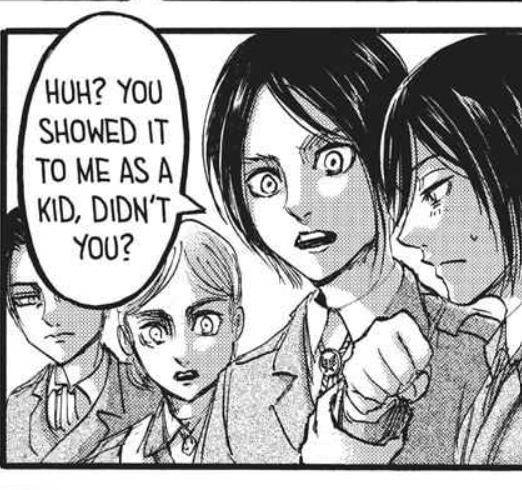
Yes. In a scene all about marriage, children, and heritage, guess who appears right next to Historia? Levi, of course! The odd thing about this is that this is the only time Levi shows up in the manga in this scene. Check out the rest of the page if you don’t believe me. He just appears... then disappears. Huh? What was that all about?
Some may criticize me for reading too much into this, but remember, even the smallest of details can turn out to be big. When Eren was talking about the Armored Titan, there was a brief cut to Reiner at the table. It’s very suspicious that this detail here was included. And the anime kept this in but with more shots of Levi watching in the background, next to Historia the whole time.

Afterwards, Historia is even more curious and gets super happy that Mikasa is her “perfect match”. This is reminding me of the whole thing with Reiner and Eren “being the same”. It’s just too bad that neither of these got properly concluded. Anyways, I find it funny that Historia is getting all chummy with the Ackerman with royal blood.

What’s the story with Mikasa being royal? In the past, the shogun of Hizuru was an ally with the royal family on the island, and his son was friends of the family. But as the story goes after the Great Titan War:

What a tragedy! It’s awful when families are divided up in great worldwide disasters.
I can’t help but see some of the similarities here between the shogun’s relationship with the royal family and the Ackerman clan’s history with the royal family. Both clans were on close terms with the king but unfortunately, when they spoke out again Karl Fritz’ ideology and could not be mindwiped, they were persecuted heavily and almost driven to die out completely on the island. But then by some miracle descendants of both clans came together to have Mikasa, who would be the one to end Eren.
Now, after this chapter, Historia is stuck in the worst possible situation due to her royal blood, but she is willing to take on the Beast Titan to save her people... but then her unresolved, frustrating pregnancy happens. And with all these bits and pieces that I have put together, it would seem that Levi would be coming home to be with the woman he has been linked to and his child and marry. Unfortunately, due to the political climate on the island, the Alliance is not welcomed at home, and it has taken Historia to give protection to Jean and Connie’s families to ensure that they are welcome for peace talks.
You see, dear readers, Mikasa’s heritage may have given us a hidden clue this whole time about why Levi and Historia are where they are.
1. The Ackerman-Reiss connection. Kenny and Uri became friends by a miracle despite the history of the Reiss family persecuting the Ackerman clan, and despite their rough start, Levi and Historia became close enough to set up an Orphanage, and based on what I have posted here, they seem to have become very close by all evidence.
2. Great Titan War- The Rumbling was catastrophic with 80% of the human population in the world killed. Things are a total mess outside of Paradis. In all of this, there is no way for the Alliance, including Levi, to get back home. In all of this, he has a child back on the island, just like how the shogun had a child left on the island after the Great Titan War.
3. Secret Heritage- The child, a little girl, may not know who her true father is. The Jaeger Faction is powerful, and if they find out that the Queen has a child with a traitor who stopped the Rumbling and contributed to wiping out Titan powers, she may as well be killed off, and things in the world could become far, far worse than what they are now.
...
At this point, you may be scratching your head and frustrated with me and how I can’t just accept that the farmer is the father because Historia is mentioned to be married. Really? Just because she marries the man doesn’t mean he’s the biological father of the child. See above for why Historia may have entered a political marriage with him. After all, he’s a former bully who redeemed himself. He may not be the man she really loves or wants to be with, but he partook in this coverup and still cared for her since the real father is trapped faraway due to the political climate. It’s a real tragedy since this pregnancy was not according to any plan but a complete accident too, so Historia probably had to make some tough decisions. The Jaeger Faction would probably grow suspicious over the puppet Queen, just as much as the MPs, for having a child and not marrying.
Besides, do you really expect me to believe that a man who doesn’t even have a consistent face to count as a character? Image created by @pas-de-deux84.

Slightly off topic, but another suspicious thing is that whenever Historia brought up in conversation, it’s always about “Historia and her children”, not “Historia and Jake’s children”. They can’t even name the man? Really? Are they aware of something they aren’t allowed to say out loud? Do they know or think that she got pregnant to save her skin? It’s only been the MPs, a third party, who recount anything about this whole situation directly.
The royal family on the island has a long history of coverups: the truth about humanity outside the walls, the true king of the Walls, Historia herself at one point. Why is it impossible to believe that Historia has orchestrated a mass coverup for her own and her child’s sake? Again, this is not helped by the fact that we got no real conclusion or answers to her actions.
And at the end of the manga, we don’t know why Levi is with Onyonkopon, Gabi, and Falco in an unspecified location either. Maybe he’s recovering from his injuries or something in a place where he and the others have been granted immunity for stopping the Rumbling. I highly doubt that it would be realistic that they are traveling the world together for fun three years after a mass genocide happens and world peace is but an idealistic illusion or even opening a tea shop.
Here’s the best thing somebody else pointed out not related to the ship in the first place: Levi and Historia have the exact same facial expressions. Levi’s is the last one he has in the manga, and Historia’s is from when the pregnancy was revealed. For some context to Levi, to be fair, he is looking up at a plane, which likely reminds him of Hange and his other fallen comrades whom he has given meaning to in their sacrifices. But what exactly is he doing after the Rumbling? We have no idea. Does he have goals? Does he want to get back to his family?

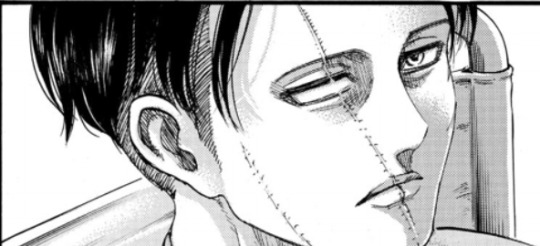
That’s the frustrating thing for me. Neither of them really had proper depth explicitly given to their final arcs, and neither do they have any moments where they reflect on their actions afterwards. Am I reading too much into this all? I may never know, but it’s the best I can think of.
...
Now, I want to talk a bit about Chapter 69, the colored chapter that was released with Chapter 139. You know, the chapter where Kenny and Uri reconcile and become friends and also where Levi and Historia have their iconic moments of the punch and becoming the next Ackerman-Reiss pair. Surprisingly, whether these two were meant to be a pair or not, they both had callbacks to moments in Chapter 69.
Levi is in the same position that Kenny was in when dying against the tree and Kenny gives his whole speech on everyone being a slave to something and how he himself was unfit to be a parent.

But Levi has “surpassed the father”. Why? Unlike Kenny, he stopped his slavery to being the hero. He gave up on his vow. He gave true meaning to his comrades’ deaths by ending the Rumbling and ending Eren. He may not have his Ackerman strength anymore, but he truly embodied at the end what the Survey Corps stood for. He dedicated all his heart. Oh, and he smiles again.
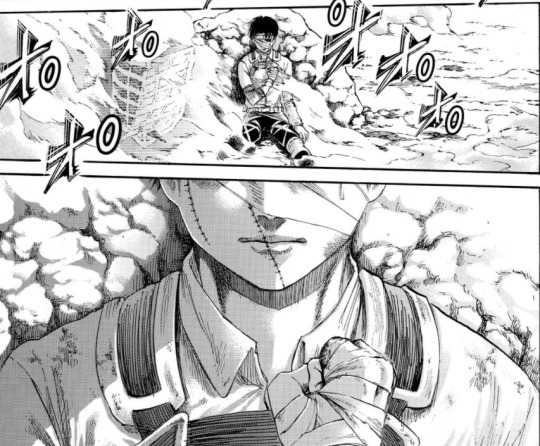
As for Historia, in Chapter 69, she became the True Queen of the Walls, a member of the real royal family.

Unfortunately, she has been a puppet queen for some time- until now- when the Jaeger faction has taken over the island, and she must use all her mind, strength, and resources to negotiate peace, or Eldians and the rest of the world are going to fight forever now.

By the way, Historia isn’t present on the podium when the Jaeger Faction is rallying the support of the crowd. She’s present here, awaiting her old friends to negotiate peace. Tell me what that says about her character.

It’s all these subtle details that just make you wonder. Could Isayama have given us all the answers we need, just in secret? It’s quite the conspiracy if you ask me!
...
Bonus round. I highly recommend reading this post about some features that the child shares with Levi’s side of the Ackerman clan.
I just love how this one image of Historia being pregnant in the anime with ridiculously long hair makes her resemble Levi’s own mother, Kuchel, who had long hair as well. And Kuchel has dark eyes here.


11 notes
·
View notes
Link
via Politics – FiveThirtyEight
Welcome to FiveThirtyEight’s politics chat. The transcript below has been lightly edited.
sarah (Sarah Frostenson, politics editor): Georgia’s new voting law has captured headlines for all the ways in which it makes voting harder. It’s also not the only state considering these kinds of laws; there are nearly 20 states in which voting restrictions have already passed at least one step of the legislative process. More than 300 voting restriction bills, according to an analysis by FiveThirtyEight, have been introduced in state legislatures this year following months of fraudulent claims from former President Trump and his supporters that the 2020 presidential election was rigged. (Sixty percent of Republican voters still say the election “was stolen” from Trump.)
But understanding the effects of laws like Georgia’s is complicated. There’s not really solid evidence one way or the other that this law will hurt Democrats or help Republicans. It’s also a point that elides a more fundamental one: If one party increasingly supports anti-democratic measures, does anything else outweigh that?
Public opinion on voting laws isn’t clear-cut either — provisions like a ban on giving voters food and water (something the Georgia law did) are unpopular, but voter ID laws are broadly popular. So let’s address the politics, public opinion and research on voting laws to better understand the contours of this debate, tackling this chat in two parts:
First, how much does it matter that Republicans’ election security push is precipitated on a lie? That is, as there has been no evidence the 2020 election actually experienced wide-scale fraud, does that undermine Republicans’ argument?
And second, how much do Americans care about voting rights as an issue?
OK, first up — The argument from Republicans supporting these new laws. What do they want in the push for more “election security”? And how much does it matter, at this point, that there wasn’t actually wide-scale voter fraud in 2020?
nrakich (Nathaniel Rakich, elections analyst): IMO, the “Big Lie” is the key to understanding Republicans’ motivations. Everyone can agree that elections should be secure. But …

… the specific methods of voting being targeted by Republicans (almost half of the voting restrictions that have been introduced regulate absentee voting), the states in which they are targeting them (disproportionately swing states), and the timing of that targeting (after Republicans lost the 2020 election) all suggest that they are only passing these restrictions because they think they will help the GOP win future elections.
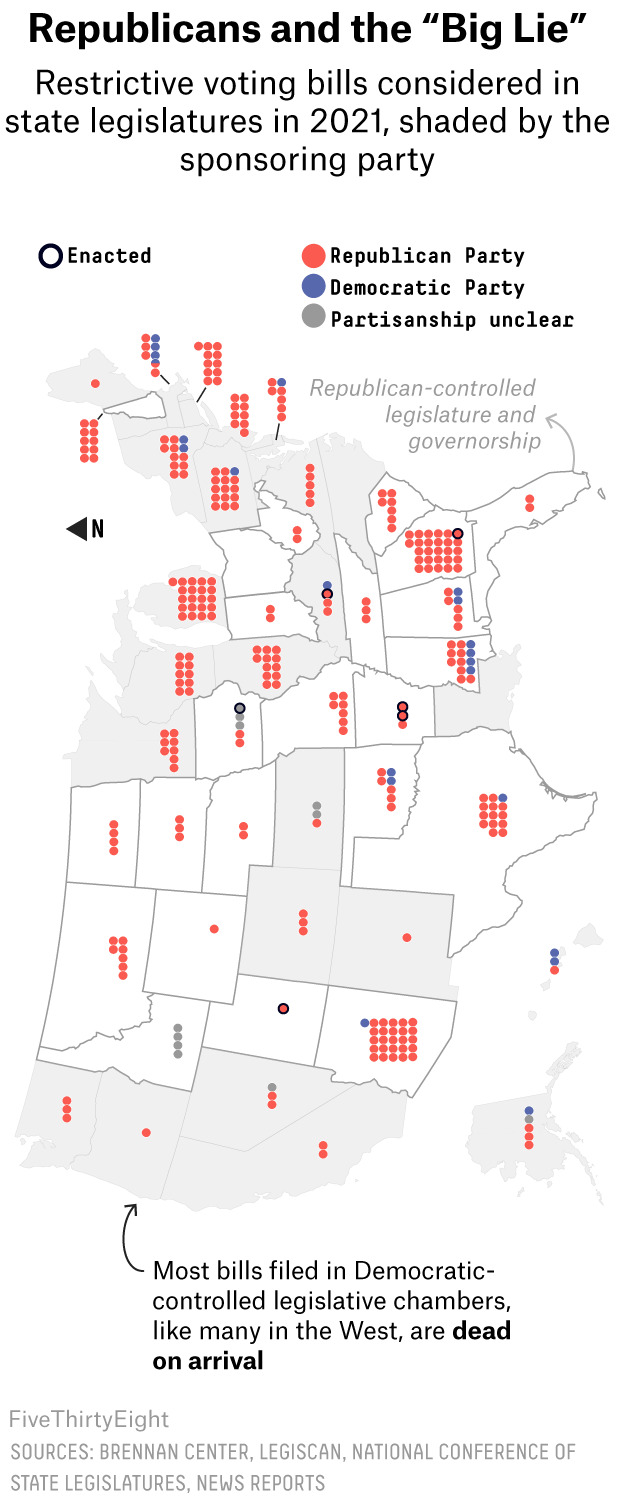
alex (Alex Samuels, politics reporter): But to your second question, Sarah, this is the narrative conservative lawmakers and many of their voters have bought into, right? That the 2020 election was supposedly stolen from Trump?
There was never — and still is no — evidence of massive voter fraud that Trump and his allies stated as fact. But because it was repeated so many times and with such certainty, large parts of the GOP electorate came to believe it.
As long as the “Big Lie” continues to be pervasive, we’re going to keep seeing these efforts to get these restrictions passed, as Nathaniel notes.
nrakich: Alex, it’s an interesting question whether these Republican legislators actually believe that rampant voter fraud cost Trump the election or they are just going along with it because it’s politically convenient. But I’m also not sure it matters. Either way, they are making policy based on a conspiracy theory.
sarah: Right, setting aside the question as to what extent Republican politicians buy the “Big Lie,” it is pervasive among Republican voters: In a March 30-31 Reuters poll, 6 in 10 Republicans said they still believed the election “was stolen” from Trump “due to widespread voter fraud.”
nrakich: And rank-and-file Republicans are correspondingly willing to make voting harder in order to get their desired outcome. According to the Pew Research Center, only 28 percent of Republicans now say “everything possible should be done to make it easy for every citizen to vote,” down from 48 percent in 2018.
alex: Republican politicians also seem to acknowledge that it’s likely they won’t win future elections without some sort of changes to the voting system. Sen. Lindsey Graham told Fox News that “mail-in balloting is a nightmare for us,” even though it wasn’t controversial before this past year. I think these changes are more about preserving power than about “voter fraud.”
And to Nathaniel’s earlier point, few Republicans lawmakers are doing anything to stop these bills from passing. Even the ones who don’t necessarily think there was fraud.
julia_azari (Julia Azari, political science professor at Marquette University and FiveThirtyEight contributor): The argument about election security boils down to an argument that people voted who shouldn’t have, right? That there were questionable votes.
And so reforms based on the “Big Lie” hinge on the 2020 election having those kinds of irregularities. People might not come out and say it was because people of the wrong skin color voted — they might say, well, people should have been ineligible because of changes to early voting rules or whatever. But in the context of both the history of disenfranchisement of African Americans and more recent fears about people living in the country illegally voting, the implication is pretty clear. When the solution is to tighten up the voting rules, you have implied that the problem is the wrong people voting.
nrakich: Yeah, Julia, you see this in how surgically targeted some of these provisions are. For example, legislators in Georgia originally proposed banning early voting on Sundays, which would end the “Souls to the Polls” initiatives that are so popular at Black churches. That provision did not end up passing, but one that did — prohibiting food and water be handed to voters in line — will disproportionately affect urban areas, where there are both more lines and more voters of color.
alex: Myrna Pérez from the Brennan Center told us something similar, Julia. The bills we’re seeing now reflect “a real fear over the browning of America, and folks trying to protect what they have and keep the power for themselves.”
sarah: And as you all are saying, sometimes it’s hard to see that this is what these restrictions intend to do, because some of the more draconian measures don’t end up passing and the exact language of the measures that do pass isn’t quite so explicit (i.e., “This voting measure intends to disenfranchise Black Americans.”).
The New York Times’s Jamelle Bouie argued this in his essay on how it’s not an exaggeration to compare the current voting restriction push to the Jim Crow era. That is, a lot of the ramifications and larger purposes behind these bills weren’t immediately clear until all the pieces fell into line. “[T]he thing about Jim Crow is that it wasn’t ‘Jim Crow’ until, one day, it was,” writes Bouie.
At this point, though, do Republicans need the “Big Lie” to push through this agenda?
That is, it feels like there is a shift at play here with Republicans increasingly distancing themselves from the election being stolen in 2020 and more so focusing on scoring points against how Democrats are now characterizing the laws (i.e., Jim Crow 2.0).
In fact, we’ve already seen some of this reframing in how Republican politicians criticized Major League Baseball’s decision to pull its All-Star Game out of Georgia over the new voting law, with Senate Minority Leader Mitch McConnell warning CEOs to “stay out of politics.”
What’s Republicans’ long-term strategy?
nrakich: Many of the new arguments that Republicans are pushing are in bad faith, though. For example, Georgia Gov. Brian Kemp has claimed that Georgia’s new law actually expands voting rights because it allows for more early voting. But that completely ignores the many more objective restrictions in the law, such as less time to request an absentee ballot and the need for absentee voters to provide voter ID — not to mention arguably the most concerning part of the law, the part that gives the state elections board the ability to remove local election officials.
alex: I agree. Republicans’ motivation, long term, seems to be anti-democratic. Even Trump dismissed proposals to make voting easier last year. So now the post-Trump strategy seems to be focused on how best to win elections, and even though Republicans have maybe not explicitly said they don’t think they can do that without overhauling the current system(s) in place, that seems to be what’s happening.
nrakich: McConnell’s request for corporations to “stay out of politics” is also pretty funny — he sounds like Bernie Sanders! What McConnell means, of course, is that he wants corporations to stop disagreeing with him politically. (Corporations have been intimately involved in politics for hundreds of years.)
sarah: It is a difficult position for a party that is traditionally pro-business to adopt this stance, too.
nrakich: Exactly, Sarah; it’s disingenuous. Republicans have historically wanted corporations to be more involved in politics — e.g., when they’ve defended corporations’ right to give money to political campaigns.
julia_azari: I mean, part of the founding ethos of the Republican Party was about creating a strong national economy based on free (as opposed to slave) labor. Nineteenth-century Republicans saw the purpose of government as being able to help American business grow strong.
So I read McConnell’s statement as “stay out of politics that challenge existing power arrangements.”
alex: Isn’t Republicans’ argument with MLB, though, that it’s overstating what Georgia’s law does?
nrakich: What do you mean, Alex?
alex: Maybe my Texas bias is showing, but Gov. Greg Abbott said yesterday that he wouldn’t throw out the first pitch at the Texas Rangers’ home opener after MLB adopted “what has turned out to be a false narrative about Georgia’s election law reforms.” (That’s straight from his statement.)
sarah: Right, Republicans are now attacking Democrats for overplaying their hand in how they’re describing what the laws actually do. But Nathaniel hit on this earlier — while there might technically be a longer early voting period in Georgia now, there is less time to request an absentee ballot and it’s harder to cast an absentee ballot because a voter must provide voter ID.
julia_azari: The inconsistency of the arguments the GOP has been using to defend their position is wild.
nrakich: Yes, Julia, it’s so bizarre! If you truly believe that “voting shouldn’t be easy” is a defensible position, you should make that argument (e.g., on security grounds).
But instead many Republicans are insisting that they are the party expanding voting rights, which suggests that they agree with the premise that restricting voting is the wrong side of the debate to be on.
julia_azari: I think this reveals a key asymmetry (or at least a potential one). Democrats can overplay their hand by stoking outrage in their supporters and end up being lambasted for being wrong or exaggerating. Republicans, on the other hand, don’t seem to suffer repercussions for changing up the logic of their arguments; instead, they seem to have found a strategy in attacking “cancel culture” whenever under scrutiny.
sarah: What’s also so hard to disentangle in laws like Georgia’s is there are really two things happening at once. First, there are actual changes to the voting process, but then there are also changes that affect how elections are administered, and in the case of Georgia, make it easier for politicians to interfere.
Nathaniel mentioned it earlier, but take the part of Georgia’s law that now allows the Republican-appointed state elections board to remove local election officials and essentially remove the secretary of state’s role in ensuring the election was conducted fairly.
We know that in the 2020 presidential election, Georgia Secretary of State Brad Raffensperger refused to kowtow to Trump’s demand that he find “11,780 votes,” but now that guardrail is gone.
A lot of what we’re talking about here is moot, though, if Democrats are able to push through their sweeping voting reform bill, H.R.1.
julia_azari: I’m on team “nothing else matters” once we’ve passed a certain anti-democratic threshold. And the provisions on election administration in Georgia’s law are worthy of a lot of attention — even if it’s not clear what they’ll mean in practice.
The period between the 2020 election and the inauguration featured a lot of attempts to mess with the Electoral College votes. There was real drama over certification in Michigan, for instance. You’re seeing a move — even if it’s slight — toward the direction that people shouldn’t actually get to choose their slate of electors or that state legislatures can have a stronger hand in that process. This is like early 19th century stuff.
sarah: Is voting rights something Americans care about, though?
alex: Considering this is something some people fought for the right to do for decades, I’d say yes. Others might have a different answer, though, because not everyone votes.
nrakich: Historically, voting rights hasn’t been an issue that has motivated many voters; it barely cracks the list of the most important problems facing the country, per Gallup polling. It’s hard to get people worked up about wonky provisions like whether people should be able to register to vote on Election Day or sometime before, or whether there should be one week of early voting versus two.
But I think framing these wonky issues as questions of rights and the health of our democracy has the potential to be very motivating. Especially if some voters (i.e., people of color) feel that their rights are being abridged.
alex: And I think that’s what Democrats have been doing so far: framing what’s happening in Georgia and other states as a “Jim Crow 2.0.”
That’s also probably easier to understand — and more motivating — than explaining the nitty-gritty measures in each individual bill.
nrakich: Look at what happened in North Dakota in 2018. The state passed a law that required voter IDs with residential addresses on them — something many Native Americans who live on reservations didn’t have. But the law appears to have backfired; Native Americans were highly motivated to exercise their right to vote in spite of the law, and Native American turnout skyrocketed.
julia_azari: Yeah, this is a pretty well-documented phenomenon. I want to make sure we clarify, though, that we are using this as an illustration of how important voting rights are to people, and not in the sense of “these laws are OK because there’s always countermobilization!” The latter caused so much angst on Twitter over the weekend in response to The New York Times’s Nate Cohn’s analysis of Georgia’s law.
alex: I’m torn on the countermobilization argument, because I’ve seen the same logic used to talk about Black voters (i.e., efforts to make it harder to vote will motivate more people and backfire against Republicans). But people shouldn’t have to surmount unconstitutional hurdles to vote!
I’m not saying you’re making that argument, Nathaniel, I’m just saying I’ve seen a few people argue that voter suppression isn’t real because a turnout gap didn’t/doesn’t materialize as expected.
nrakich: Agreed 100 percent, with both you and Julia. Even if a law doesn’t deter a single person from voting, it might still be restrictive if it imposes additional hardships on existing voters.
For example, even if people are willing to wait hours in line to make sure their vote gets cast, that inconvenience can have non-voting-related consequences, such as having to pay extra for child care or losing out on wages at your hourly job.
sarah: For sure, the most important thing is that people have the right to vote without it being a burden. But I also want to return to this question of electoral impact, because the research is really mixed on it.
Some studies have suggested that absentee voting didn’t help Democrats’ margin in 2020, or as Cohn’s analysis of Georgia’s law suggests — it’s really hard to know whether this will impact turnout negatively in elections moving forward. But something we found in the research for our 2020 forecast was that if we account for changes in how easy it is to vote in each state based on a cost of voting index researchers have put together, states with higher barriers to voting tend to produce better results for Republican candidates while states with fewer barriers tend to lean more toward Democrats.
nrakich: I think a lot of nuance is called for when attempting to answer this question of electoral impacts. Discussions like these often lump different types of voting restrictions (or expansions) together, but not every voting reform is created equal.
For instance, I am persuaded by the studies that show that changes to absentee voting laws are unlikely to change the outcome of an election. But political scientists have found that things like banning/instituting same-day voter registration actually can have significant effects! This thread from political scientist Charlotte Hill was very instructive in that regard:
The idea that making voting easier *won't* improve turnout is one of political science's worst takes. (And to be clear, many political scientists don't buy it.) In this thread, I'll explain why. Buckle up. https://t.co/NH1HH0YYuZ
— Charlotte Hill (@hill_charlotte) April 3, 2021
sarah: It also seems as if making voting easier is becoming an increasingly polarized issue, with far more Republicans now unwilling to say that “everything possible” should be done to make voting easier.
julia_azari: Yeah, on the question of polarization, this debate isn’t necessarily always going to be directly related to which laws help which parties, but rather how voters understand those laws in relation to their own partisan motivations — what they dislike about the other party, how their own identity motivates their partisanship.
This thread from political psychologist Christopher Federico linking support for restrictions to racial attitudes is also useful.
Been digging into the new 2020 ANES release this week, and I got curious as to what might predict negative attitudes toward increasing ballot access. So, I took a look at the ANES items on early voting, voter ID, and felon disenfranchisement. (1/n)
— Christopher Federico (@ChrisPolPsych) April 2, 2021
sarah: Where do you all think the fight over voting rights heads next?
alex: Whether Democrats can actually agree on something and get H.R. 1 passed is a big open question. But there’s also how many of these restrictive bills actually pass and where that leaves Republicans two years down the line.
If Republicans only pass a few dozen of these bills, do they continue pushing for them in future legislative sessions? (I would bet the answer is yes, but I’m curious to see how this progresses over time.)
julia_azari: A couple of questions I have been thinking about: One is the degree to which Trumpism within the Republican Party is about winning elections without winning majorities of the multiethnic electorate, and another is where standard political hardball ends and being anti-democratic begins.
And at the risk of sounding stupid because I know these things are so intertwined at this point, I also wonder how to think about what’s about partisanship versus what’s about race. A really cynical take would suggest that elite Republicans are taking advantage of the salience of these demographic issues in order to produce institutional changes to consolidate power.
nrakich: I just think voting rights is an extremely nuanced issue that requires people to acknowledge a ton of realities all at once.
Some voting restrictions probably don’t affect turnout or who wins.
But others might.
But backlash/countereffects can scramble that calculus too.
But electoral impacts are only one small part of why these laws matter.
They matter in how they affect the convenience of voting too.
Regardless of impact, intent is important (e.g., it matters that Republicans are pushing voting restrictions shortly after losing a major election and crying “voter fraud” about it).
It matters normatively that it has become the position of one of the two main political parties that it should be harder to vote.
Regardless of impact, context is important (e.g., this is not the first time that a state like Georgia has tried to make it hard for certain people to vote).
It’s important to acknowledge the racial impacts/motivations of these laws.
“Voting restrictions” (or “voting expansions”) is an extremely broad term that encompasses a ton of more specific proposals, which should probably be judged on their own merits because they each have different impacts and are just or unjust to varying degrees.
5 notes
·
View notes
Text
More Than Meets the Eye #9- Cops is Filmed on Location With the Mechs of Law Enforcement
It’s time for some gotdang origin stories, y’all.
Back before the war, when Functionist ideology was really just rocking the scene hardcore, Nightbeat stood outside of Maccadam’s New Oil House and had a chat with Quark.
No, not that Quark, the other one.
Quark’s reading an article at Nightbeat’s request about an attack on something called a relinquishment clinic, by a member of the Decepticons. Quark’s not a huge fan of the Decepticons, because he’s got a good thing going on Functionist Cybertron as a rare proton microscope, and even if things aren’t perfect, they’re pretty okay for him personally. At least he’s aware of his privilege.

Don’t be so quick to judge, Quark. Some Decepticons are into microscopes.
He’s pretty convinced that if the Decepticons get their way, they’re going to murder anyone who’s never handled a shovel. This is the same sort of misconception a lot of people have about the phrase “eat the rich”- it’s more about those who benefit from the social structure by way of oppressing others as opposed to those who flourish within it by their own work ethic and talents.
Granted, we as the reader know that shit is absolutely going to go sideways for everyone once the war kicks off, but Quark as it currently stands shouldn’t be nearly as worried as he is. He thinks Rung of all people is a threat, so you can tell he’s really feeling the paranoia of the times.
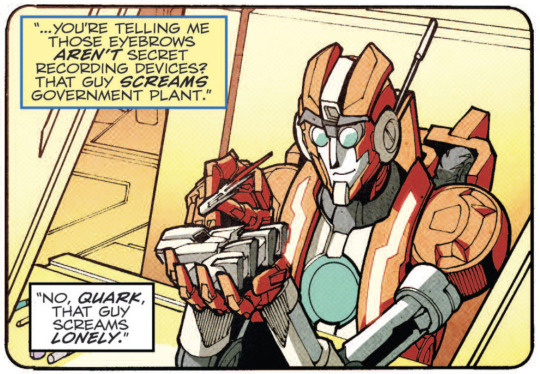
Hi Rung! Hope you’re enjoying your you-time. It’s important to have that, good for mental health.
The conspiracy convo gets cut short as Quark’s drink gets dripped in.
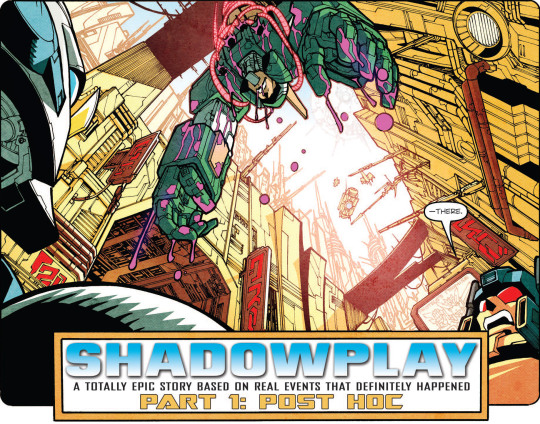
I mean, it’s all the same stuff, right? He could probably still drink it. Waste not, want not.
In the present day, we set up our framing device, with all of our friends welcoming Ratchet into the fray, as he shows off the fact that he finally color-matched his hands to the rest of his body.
Here’s a little joke for you: a spiritualist, two doctors, an archivist, a sentient marshmallow, a victim of ritualistic mutilation, and the hottest guy on the ship watch a third doctor walk into a bar.

Gentlemen, please, I haven’t even gotten to the punchline yet.
Anyway, Rewind’s set up this little hang sesh for medicinal purposes, after consulting Chromedome on the nature of the brain.

Rung’s looking a lot better than the last time we saw him, in that he’s got a head again, but he’s not really… functional right now. Hence this little meet up- everyone here has had their paths cross many times in the past, whether they realized it or not.
Except Tailgate, who took a six million year dirt-nap. He’s just here for shits and giggles.
And Swerve, but it’s his bar, and he’s lonely, so of course he’s going to stick around for this.
Anyway, those assembled will be taking turns in telling the story they all played a part in, in an attempt to kick-start Rung’s brain back into letting him do literally anything. Thanks to his obscenely large collection of historical documents and footage, Rewind more or less knows the structure the story will take- as shown by his conspiracy bulletin board that maps out everything that will be covered in the Shadowplay arc. The central pin in all this? Well, it’s Transformers, and it’s been a hot minute since we’ve seen the face of the franchise, so you tell me who it’s going to be.
Rewind sets the scene, giving everyone the skinny on the setting we’ll be in for the next little bit.

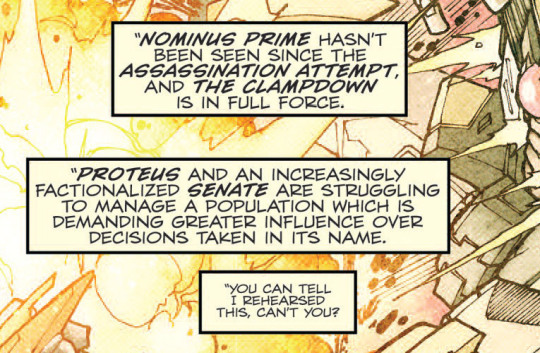

Way to see the silver lining, Swerve.
Chromedome starts the story off, because he’s a main character in all this, and also if you think Rewind would pass up the chance to listen to this capital-T-shaped dweeb talk, you’re deluding yourself.
In the past Chromedome worked mechaforensics- y’know, forensics for mecha- under a different name, which we will not be learning at this current time because it’ll muddle the already-convoluted narrative we’re about to get going here. Chromedome had the displeasure of working alongside then-desk jockey, Prowl.
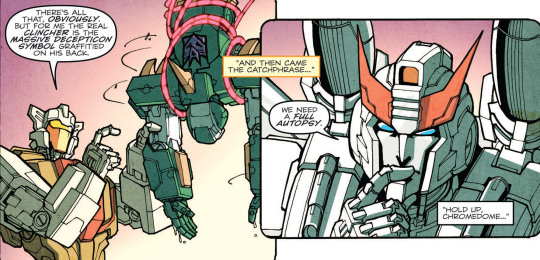
Awful geared up for a desk jockey, ain’t he?
Yep. Chromedome used to be a cop, he partnered up with Prowl, he looked even more like a koala than he does now, and he was on the case of the assassinated Senator Sherma. What they don’t tell you is that if Sherma had turned out to have survived the ordeal of being strung up from a bridge upside-down, he would have been charged with food and health code violations for that little stunt he pulled on Quark’s drink.
Skids breaks the narrative flow to get the low-down on Prowl’s whole deal, because he doesn’t know who that is. Swerve breaks it down real quick, while Rewind provides visual aid.
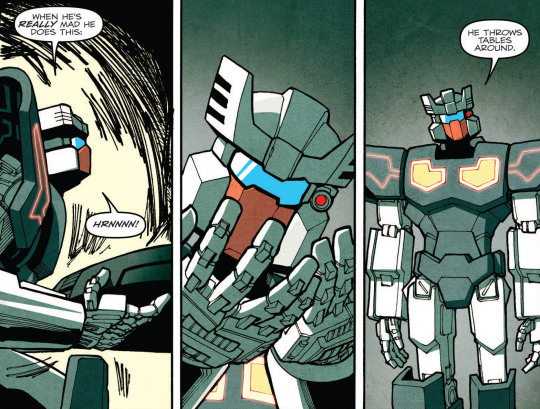
A for effort.
The boys get a little distracted discussing Prowl’s anger management practices, until Drift asks that they move on, because Rodimus is sending him insulting messages on his tiny and paper thin comm because he can’t handle being ignored by his #1 fan. It’s just as well though, because it’s Drift’s turn to spin the yarn.
So, once upon a time, Drift wasn’t doing so hot. It wasn’t the whole “I’m a murderous Decepticon” thing- that was later on- but rather a horrific drug addiction, sense of self-loathing and being homeless. On the day of Sherma’s assassination, Drift was so out of his gourd on circuit speeders, he didn’t even register the fact that he was approached by a pair of robots and promptly beaten by the two of them for money.
Things looks bad for poor Drift, but not to worry, because the main reason for this arc existing just showed up.

There he is, in all his pin-up art glory.
Orion Pax, the mech who would become Optimus Prime, proceeds to arrest Sonic and Boom- yeah, it’s the two guys from Delphi, we aren’t wasting the brain power on creating two new characters for this one scene, that’s crazy talk- and then calls for a bus to keep Drift from biting it due to drug overdose.
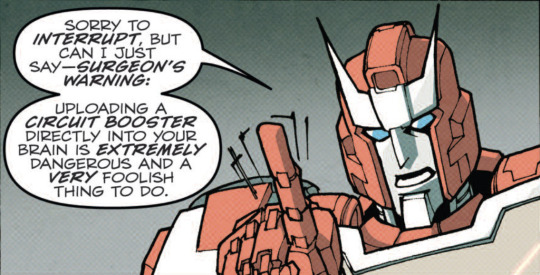
Listen to the professionals, folks. They know more than you about the shit that can kill you. It’s why they get paid the big bucks.
(I have no idea what Ratchet’s salary is like.)
Drift is taken to Ratchet’s super-secret, please-don’t-tell-the-Senate-about-this clinic in the Dead End, where we get a taste of Drift riffing on Ratchet in the present, as he paints a picture of a spiritual young doctor who actively and loudly praises Adaptus as he works on a ODing patient. The Ratchet of the here and now doesn’t appreciate this twisting of the truth, and makes it known by smearing his still-wet hand paint all over Drift’s face.
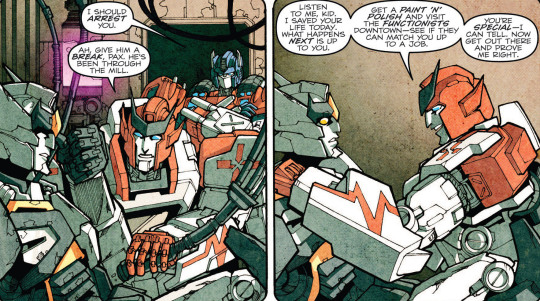
Shane McCarthy slipped James Roberts a twenty to set up a slowburn between his OC and Ratchet back in issue #4. Here, Roberts tends to the seeds of their shared past that were planted in the Delphi arc.
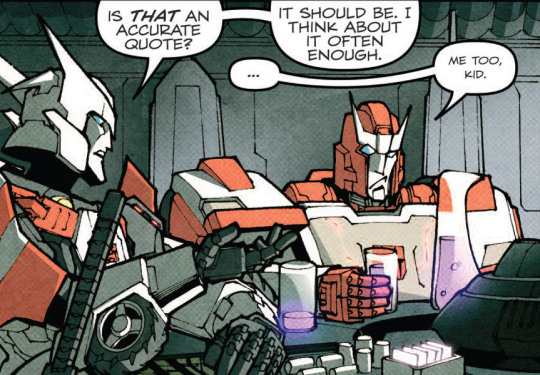
Drift didn’t take Ratchet’s advice back then, something that is and will continue to be a running issue for the two of them, and the sudden downshift in tone lets Tailgate ask about just what in the sam hill a relinquishment clinic is. Chromedome fills him in, Rewind providing visuals.
A relinquishment clinic was a place where a Transformer could sell their body- not in a sex-work way, but literally, as you let someone else have their spark planted into your vacated frame for a short period of time, just to try out different modes and looks. It was expensive, and only used to get around the fact that only the most elite of cybertronians could alter their bodies, because only they had enough influence to have the Functionist Senate look the other way. Ratchet never approved of the practice, and this is where he takes over the story.
Too bad we don’t get to see what all that’s about just yet, because there are more pressing matters at hand, like the fact that Nominus Prime is dead.
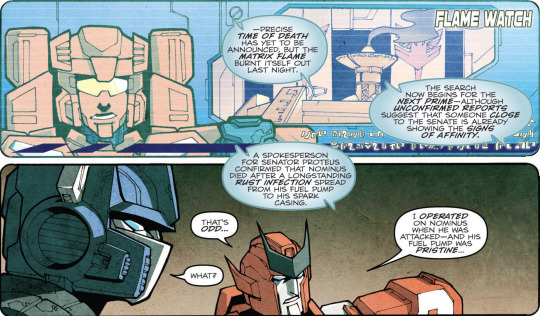
Seems like there’s a conspiracy at hand, and Orion is considering introducing Ratchet to a friend on the inside- and in the present time, Drift leaves to go meet with Rodimus so he’ll stop being a pest. Chromedome picks his story thread back up, bringing us to Prowl’s requested autopsy.
The boys in the lab broke Sherma down to his base parts, labeled each part, and laid them out on the floor in no discernible order. Maybe it’s based on the Cybertronian alphabet. I suppose we’ll never know.
The autopsy revealed that Sherma was shot several times, which we’d already managed to suss out at the scene of the crime, without getting half the forensics team involved, but we did get a little something for our troubles.

More evidence for Rodimus’ Uggs.
No, I’m never letting this go, don’t even bother asking.
The kind of glass that they found is only found in one specific area of Iacon, known as Translucentica Heights, and how about that! Prowl just so happens to have a search warrant for Translucentica Heights. Wow. Way to go, Prowl.
Meanwhile, Ratchet and Orion are hanging out at the monument for the Ark-1, which is the ship that fucked off into space and got eaten by the Dead Universe. Cyclonus remembers. I bet he kind of wishes that he didn’t, but he remembers.
Orion’s very good friend the Senator shows up, and Orion introduces him to Ratchet. The Senator was first introduced in Chaos Theory- he’s convinced that Orion is a very special individual, and had his body altered without permission while he was passed out, so that he might one day carry the Matrix.
Orion is maybe just a touch too trusting of authority figures, unless that figure is god himself.
Ratchet helps create a visage of not-plotting, as Orion and the Senator discuss whether or not Nominus was assassinated by the Senate. Dear Senator says “fuck yeah he was” and it was in no small part due to the fact that the Matrix he was carrying was a fake.
There’s also something that’s going on between Sentinel and the Decepticons, which leads Orion to ask about Megatron and how he’s doing. He’d probably be doing a hell of a lot better if you hadn’t given the Senate that he directly opposes his full name and occupation, Orion, but it’s sweet that you’re worried.
Back with the wonder cops, Chromedome and Prowl are shooting across the sky to the tune of Shooting Star as they make their way over to Translucentica Heights. They discuss the validity of claims that the Institute exists as they make their way over to Sherma’s apartment building, when someone gets thrown out the window from roughly 4000 stories up.
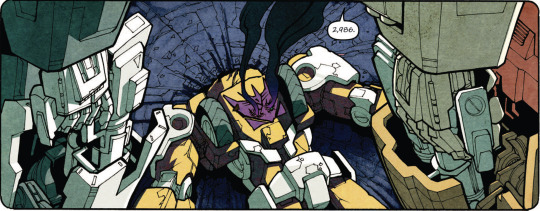
Trailbreaker was right, Fort Max having guns in his legs doesn’t make him special, if these losers are doing it too.
In the present, Drift’s finally caught up with Rodimus in the oil reservoir, where he’s coaxing Grapple like a wounded baby deer through pulling something out of the muck.
It’s Red Alert, and he’s seen better days.
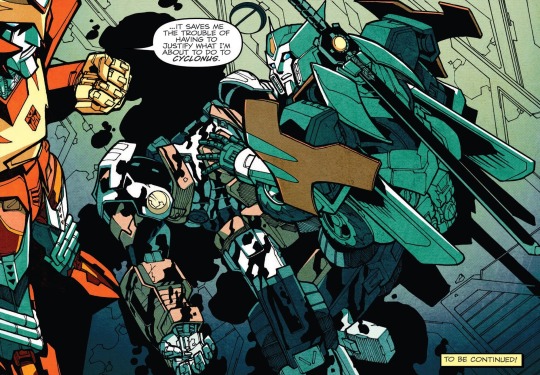
I mean, sure, that seems like the most likely option, seeing as he’s the only non-Autobot aboard this giant stupid ship, and you haven’t done anything to actually gather evidence on what’s happened to our pal here. It makes sense for the knee-jerk reaction to be to blame the dude who blew up Kimia.
We’ll see where that line of thought gets us next issue.
#transformers#jro#mtmte#shadowplay#issue 9#maccadam#Hannzreads#text post#long post#comic script writing
69 notes
·
View notes
Text
Where Conspiracy Reigns
Paranoia never stopped haunting Brazilian politics. Now, with Jair Bolsonaro in charge, it’s as powerful as ever—and its practitioners have learned a lot from the American internet.

As the 20th century began, conspiracy was simply how Brazilian politics got done. Paranoia was everywhere, and often warranted. Secret plotting and military coups were routine across the political spectrum. And by the end of the Cold War, citizens in Brazil’s young democracy had inherited a world of deep-seated suspicions, and would have to look back on a dizzying set of contradictory narratives to understand their own history.
In 1930, one of these putsches propelled a man named Getúlio Vargas to the presidency. Then conspiracies, both real and fake, helped lead the country to dictatorship. In 1935, a right-leaning newspaper published a story—entirely false—reporting that communists were planning an uprising that would eliminate “all non-communist officials.” But then leftists, worried about a fascist turn in the Vargas government, did attempt a real rebellion. It was quickly crushed, but not before Vargas used it to justify the consolidation of dictatorial powers.
Two years later, right-wing forces came up with another fake conspiracy, one that would stoke paranoia for decades. Plano Cohen, or the “Cohen Plan,” was, supposedly, a dastardly Jewish-Communist plot to overthrow the government. It was a forgery, drawn up by the fascist General Olímpio Mourão Filho. But it was presented—and covered by the press—as if it were real, and Vargas used the invented crisis as justification to carry out a new coup and launch a full-fledged dictatorship.
What happened over the next three decades provided even more fuel for Brazil’s culture of conspiracism. In 1962, with democracy restored, officials in Washington worried about President João “Jango” Goulart, a liberal reformer: In a recorded conversation, President John F. Kennedy and United States Ambassador Lincoln Gordon agreed they should discreetly inform the Brazilian military that it could take action “against the left,” if needed. The U.S. stepped up covert operations in Brazil, and Kennedy sent the military attaché Vernon Walters into the country. Brazil’s right-wing forces began to spread the accusation that a communist coup was brewing, even as they plotted themselves. When the U.S.-backed coup started on March 31, 1964, the charge on Rio de Janeiro was led by Mourão Filho—the same man who created Plano Cohen three decades earlier. The general that took over as the first “president” in the resulting dictatorship, Humberto Castelo Branco, had been roommates with Walters—JFK’s military man in Rio—back in the 1940s.
It’s no wonder that Brazil is fertile ground for conspiracy theory. What you just read is the true story of how Brazilian power and political might whipsawed back and forth from democracy to dictatorship in the 20th century; or at least it’s the closest thing we have to the truth. But this account emerged only after years of research, after historians pored over thousands of declassified documents; for a long time, anyone guessing at the real truth would have been, by definition, a conspiracy theorist. That’s because powerful actors had indeed conspired behind closed doors—to smear the left, to align Brasília with Washington, to lie to the public—but without all the evidence, the best citizens could do was theorize about their nature.
These episodes also point to a recurring pattern, and a dominant theme, in the politics of Brazilian conspiracy: The forces seeking to upend the social hierarchy in this stratified society usually lose, and those who win often weaponize conspiracy theory to justify their own movements. As a result, conspiracy theories in Brazil usually end up reinforcing the powers that be. Latin America’s largest country now offers a chilling reminder of the ways that rumor-mongering and disinformation can shore up elite power and subvert democracy.
Continue reading.
#brazil#brazilian politics#politics#history#fake news#political propaganda#jair bolsonaro#mod nise da silveira
19 notes
·
View notes
Text
A Hallmark Sophistic Tendency and More on Epistocracy
Sophism is when one reasons fallaciously in hopes of deceiving someone. In other words, it is when someone employs fallacious, yet convincing, reasoning to sway someone. In some cases, people with these tendencies will project by accusing their opponent of sophistry or they will employ a No True Scotsman in saying that their opponent cannot possible be a “real” philosopher. I do not take kindly to such ad hominem and that is why I discontinued the discussion. Some of you may have seen this in my opponent’s response yesterday. These issues are minor. The major issue is in how he defines words.
Sophists tend to define words by omitting the use their opponent is using. When I say voting rights infringe upon other more integral, unalienable rights like the right to life or healthcare, I am not at all talking about a negative right, as he defined, in where one can hypothetically defend their right using force. While this is a definition of a right, it is not the only definition on offer. A right is also a principle of entitlement, a positive right, and so, when I say someone has the right to life, what I am saying is that they are entitled to live, irrespective of what the Constitution says; the phrase right to life in The Declaration of Independence is described as unalienable, god-given if you prefer. While there are clauses attached to this entitlement, such as they are entitled to live given that they do not murder someone, my definition is just as valid as the one my opponent employed. The difference is that my opponent dismissed my definition in order to deceive his readers. That is to say nothing of the validity of the distinction of negative and positive rights; plenty of philosophers (e.g. Eric Nelson, Ian Carter, Henry Shue) do not think the distinction is valid or even necessary.
He, for instance, continued to accuse me of not knowing what rights are, as though definitions themselves do not describe words in a self-evident fashion. A right is sometimes synonymous with a certain entitlement, but not all entitlements, real or imagined, are rights. A man may feel that after dating his girlfriend for five years, he is entitled to have sex with her. Consent is still at play no matter how long a couple has dated and so, he is not entitled to have sex with his girlfriend; she is not entitled to sex with her boyfriend either. These are matters of consent and as such, it is a privilege that they grant one another. The right to life is self-evident as even the Declaration of Independence attests. I do not need to go any further on that.
In that same vein, he mentions consent of the governed and people providing healthcare and bizarrely asserts that taxation is a violation of bodily autonomy; he does nothing at all to ground this claim, but, ironically enough, begs the question. Under the current government, 100 million or so people forgo their voting rights every election and many more forgo their rights as it pertains to electing state and local officials on a year-to-year basis. This implies that the right to vote is not as integral as some argue and definitely not as integral as my right to life. I may willingly surrender my right to vote given that I’m not particularly drawn to any of the candidates; I will not willingly surrender my right to live, assuming I am not terminally ill or mentally incapacitated. I am entitled to live and that is an integral entitlement; I am also entitled to vote, but that is not an integral entitlement as I can willingly choose not to.
What I have proposed, as Plato and others before me have, is an Epistocracy. Also of note is that he flat-out asserts Plato was wrong without justifying it; that is more more evidence that he has presupposed his conclusions. It is not a soft tyranny as he claimed. It is rule of the knowledgeable. What I am basically arguing is that if a third of the population is not going to vote anyway, we should decide on which one-third that is. The one-third that I temporally want to exclude are the least informed and that is assuming that such people even comprise one-third of the population; they might comprise a smaller portion than one-third and as such, I can say that at least I am not excluding as many people as are currently excluded and who have been excluded, at times, with malicious intent. The least informed are individuals who have not learned to or do not care to think critically. Since they do not think critically, they are prone to ignoring crucial issues and engaging in cult-like, conspiracy-based reasoning. A White Supremacist, on paper, is entitled to vote, but since he votes to harm minorities, he should not retain that entitlement.
Felons are largely excluded from the political process because they surrendered that entitlement in breaking the law. So it is up to my hypothetical government to decide at which point someone has committed to all that is required prior to breaking the law. What separates the average White Supremacist from Kyle Rittenhouse? The question boils down to who is armed and who is not and who is willing to harm or murder minorities versus who is not. Who then is the ideologue and who is willing to act on erred convictions? Since there is no sound reasoning to justify racism, discrimination, and prejudice, then White Supremacists should not be entitled to vote. Since there is no way of predicting which White Supremacist will act on their erred convictions, they should not be entitled to vote. Full stop!
The consent of the governed does not reduce to mere voting rights. In being a citizen or legal immigrant in the United States, you have de facto consented to be governed whether you vote or not, whether you are entitled to vote or not. Our current government already excludes a large portion of the population due to criminal records, gerrymandering, and other forms of voter suppression. So there is no material difference in my saying that we should exclude certain people for reasons separate from the ones the government uses to justify their exclusion and disenfranchisement of certain voters. As I have shown, however, I think my reasons for excluding the woefully ignorant are far better than the reasons given to exclude an entire demographic in a certain district or most felons without distinction. The primary reason is that voting rights cannot be prioritized over unalienable rights, so if a person votes with the intent to harm minorities, the minority’s right to live supersedes the White Supremacist’s right to vote. If I have to ground an entire moral framework to prove that conclusion, then my opponent is basically arguing that the right to life is not unalienable and is therefore, a privilege reserved for some and not others.
All felons are not created equal. Sure, a murderer on death row has long surrendered his entitlement to vote. Someone wrongfully accused of a crime or someone serving a marijuana-related sentence should not be excluded. Yet, in most cases, no distinction is made between the former felon and the latter. Then there is the real crux: my exclusion is not permanent. You can be a White Supremacist today and not be one tomorrow. That means that you can learn why you are wrong about non-Whites and come to see common humanity in minorities. Any and all kinds of ignorance can be rectified given time, so it is entirely possible to justify a vote for any candidate in an informed manner. What my hypothetical government would guarantee is an informed voter who does not vote along party lines, who does not double-down on a quasi-fascist like Trump, who does not ignore science and the urgency of Climate Change, and so on. A more informed electorate is absolutely a good thing and the exclusion stemming from my hypothetical government is preferable to the extant exclusion in the current U.S. government.
In any case, this is why I refused to exchange further. Sophists define words by omitting definitions they dislike. They accuse, commit fallacies, and project their errors onto you. Ultimately, sophists tend to be disingenuous because they have predilections and surmises they think are self-evident and so they do not commit to the philosophical work of reasoning to their conclusion; this was observed in my opponent’s bizarre claim that taxation violates bodily autonomy and that the provision of healthcare, in where one is paid by the government, is also a violation of bodily autonomy. These conclusions are not argued for or justified in any way and entirely ignore state-provided healthcare in other countries in where people have consented to pay their taxes for sake of receiving free healthcare and tuition-free college educations.
I have reasoned to my conclusion. I have seen the real harm in letting ignorant people vote year after year; these people have been given no (dis)incentive to rectify that ignorance. So basically what I am saying is that if we disincentivize ignorance, people will want to become more informed. They would not call every disagreeable story about their favored candidate “fake news.” They would not go down the rabbit-hole of conspiracy theories. They would have good reason to change. I see nothing at all wrong with telling people this: if you want to vote, demonstrate that you are informed enough and empathetic enough to participate in this process because your vote has palpable effects on other lives. After nearly four years of suffering through the lack of empathy, apathy, hatred, and incompetence of the Trump Administration, I am more resolute now than I was two years ago: everyone should not be entitled to vote; only the demonstrably informed in the U.S. population should do so and as such, I propose Epistocracy, the rule of the knowledgeable as that incentivizes everyone to become more knowledgeable before casting a vote.
I will conclude by saying that the false equivalence he made between Epistocracy and tyranny can be dismissed very easily: Epistocracy does not permanently exclude anyone, so if anyone has an issue with being governed by the knowledgeable, then it is incumbent on them to demonstrate the aptitude to join the ranks of the knowledgeable; tyranny, on the other hand, excludes the governed and subjects them to any number of abuses. Epistocracy is not about abuse, but rather about preventing the abuse suffered by the more empathetic and knowledgeable at the hands of the cruel, apathetic, and ignorant. Perhaps we should want to exclude malignant Psychopaths, Narcissists, Sadists, and Machiavellians, most especially when they have dehumanizing and degrading views of people they do not agree with. This is beyond, “I do not like your voice” or “I do not like these people.” This is about people who speak harm and carry out actions consistent with dangerous and potentially fatal beliefs.
The United States cannot continue to tolerate such ignorance and it is clear that the entitlement to vote has fallen into the wrong hands. In the least, I can say what a lot of other people cannot say: I have proposed a viable solution. I also happen to think it is among the better solutions, especially in light of my opponent’s tacit anarchism and admiration for Capitalism. I will not challenge a sophist on such erred points of view, as they have already presupposed the conclusion; this is also painfully obvious in his ego-stroking as it pertains to Marxism. He has claimed to debase all of Marxism and this should not surprise anyone given that my opponent’s love for Capitalism entails feeling threatened by an anti-Capitalist like Marx. There is no argument to be had with such people. In any event, be mindful of the tendency to define words by omitting key definitions. Such an individual does not want a genuine dialogue; they just want to win. Nothing productive comes from that.
#philosophy#political philosophy#politics#epistocracy#voting rights#voting#marxism#epistemology#sophism
12 notes
·
View notes
Text
Silver & Blaze Origins Theory
NOTE: This is just for fun and isn’t proven by canon material. EDIT 4/26/2020: Added a read more & better Silver evidence.

A lotta things bother me about these two. Based on the canon info we have (outlined in this in-depth post), we know they both originate from the distant future. When Blaze seals Iblis inside herself, she leaves the distant future and fades into the Sol Dimension. In turn, she becomes princess of the Sol Dimension, which later involves her in the events of Sonic Rush. Neither Blaze nor Silver remember one another because the Sonic 06 timeline resets. However, they do meet anew in the new timeline.
Time reset paradoxes aside... I have questions.
How did Blaze seal Iblis inside herself?
How did Blaze seal herself into another dimension?
How did Blaze arrive in the Sol Dimension’s present rather than its future?
How did Blaze become princess of the Sol Dimension by dropping into it?
How does Blaze have an affinity with the Sol Emeralds when she’s not from their dimension? (enough to turn into Burning Blaze)
Before anyone points it out, yes, I’m aware several of these can be answered with “bad writing.” But I want to have fun with lore and logic.
I’ve created a theory that satisfies all these questions. I acknowledge that one of the questions has a canonical answer, but the rest are based on assumptions made by the player. For fun’s sake, let’s question those assumptions. Then at the end I’ll present my theory.

1) How did Blaze seal Iblis inside herself?
Because her soul is alit with flames. That is, if you believe the answer from Sonic 06.
Let’s establish the rules the game lays out for sealing Iblis. First, Iblis can be sealed inside members of the Soleanna royal family.
Eternal Sun! The Living Flame that has been entrusted to the royal family! Fall into slumber with a royal soul!
- Duke of Soleanna
Second, Iblis cannot be sealed inside Silver.

We can rule out that Silver used the wrong incantation, wrong number of Chaos Emeralds, or that he must have special training or bloodline, because the third thing we learn is Iblis CAN be sealed inside Blaze. And she used the same method he did. The only difference is her soul.
Don’t worry. My soul is already alit with flames. I will be accepted.
- Blaze the Cat
To me, this explanation seems a little too convenient. An exception to the royal soul rule exists? And it’s a soul alit with flames? Which in of itself is a rarity considering no other character consistently wields fire powers, much less has these powers associated with their SOUL. And Blaze just happens to exist in Silver’s timeline AND is close enough to him to be involved in the events of Sonic 06 and have the opportunity to perform the seal?
Convenient as it is, it’s still an explanation. I could accept this answer... Or, I could point out a much more interesting factor to consider. Blaze just happens to have a royal affiliation... more on that later.

2) How did Blaze seal herself into another dimension?
This takes place in-game, yet there’s no explanation. Add in the fact that it’s apparently something Silver can do too, and it makes even less sense.
Come on, make it quick. Use your Chaos Control... to stop time. Then... seal us into a different dimension.
- Blaze the Cat
Considering Silver learned to use Chaos Control, it’s plausible he could’ve stopped time like Blaze asked. But how exactly was he supposed to seal her into a different dimension? There’s two possibilities: 1) Chaos Control, or 2) It’s an innate ability.
Innate ability is absurd. It’d make Silver way overpowered and begs the question why he never helped everyone escape from Iblis to a different dimension before this. But Chaos Control isn’t much better. Sonic, Shadow, and Silver all use Chaos Control to open time portals throughout Sonic 06. But not dimensional portals. On top of that, 2 people and 2 Chaos Emeralds are required to open these portals.
What amazes me is when Silver prepares to do as Blaze told him, he’s not even holding any Chaos Emeralds. How does he expect to do it with a flick of his arm?

In the end, it doesn’t matter, because Blaze herself is the one who does it. But establishing how unlikely it is for Silver makes it even less likely for Blaze. She never learned Chaos Control. And, seeing as only hedgehogs are known to wield this ability, it’s doubtful she can.
So... how did she do it? Maybe it’s some combined effect of Iblis, the Chaos Emeralds, and her soul, but... that’s a lame explanation.
There’s one more possibility if we watch the cutscene closely.
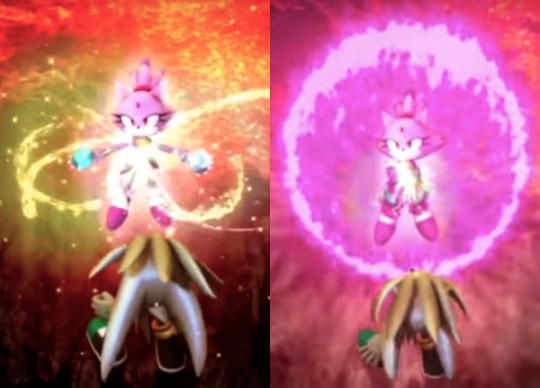
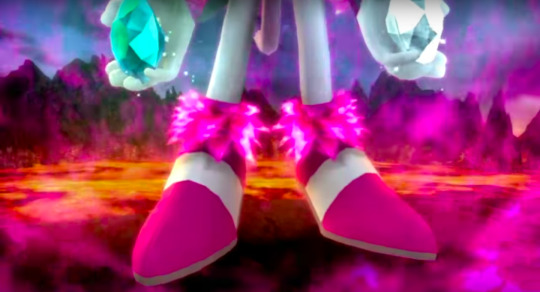
The Sol Emeralds.
It can be debated that she’s turning into Burning Blaze here. It lasts maybe 2 seconds. You can watch and decide for yourself here.

Burning Blaze brings the Sol Emeralds into the equation. And for me, they’re the best explanation for how Blaze transported to a different dimension. After all, they were a contributing factor in her transporting to Sonic’s dimension in Sonic Rush. Another thing of note is almost immediately after turning into Burning Blaze, she starts to fade away, suggesting that activating the form triggered her fade into another dimension.
There’s a problem though. Up to this point, Blaze has had no association with the Sol Dimension or its emeralds. So how can the Sol Emeralds be here?
Maybe you can argue she gained access to the Sol Emeralds by beginning to fade into the Sol Dimension itself. But how did she start fading into the Sol Dimension without first accessing the Sol Emeralds? A lotta people allow time and dimensional stuff to be a little paradox-y, but I don’t wanna be so lax.
This leads me to believe: Blaze has always had an association with the Sol Emeralds. How? More on that later.

3) How did Blaze arrive in the Sol Dimension’s present rather than its future?
Or, to ask it another way, if Blaze entered the Sol Dimension from the future, why does she end up in the present when she crosses back over in Sonic Rush and other games? Shouldn’t she end up in the future with Silver?
Frankly, if a series lets characters jump dimensions and timelines, it’s not that far-fetched to let them jump both in one go (see: Eggman Nega). But to give a less magical answer, the reason could be Iblis. The Duke was conducting experiments on Solaris in an effort to manipulate time. If Iblis is associated with time too, it could’ve taken Blaze to a different time in the Sol Dimension.
This question doesn’t add or detract from my theory, so I won’t include it in the last section. I included it here cuz it’s a good question I’ve seen asked.

4) How did Blaze become princess of the Sol Dimension by dropping into it?
Now here’s a big one.
Surely the Sol Dimension existed before Blaze entered it, as evidenced by its long history and heritage. And part of this heritage states the role of guarding the Sol Emeralds is passed down the princesses of the royal family. How can Blaze just drop in and become the princess when she hasn’t had any association with the Sol Dimension up to this point?
I see 3 possibilities: 1) Blaze transporting to the Sol Dimension caused the dimension itself to change and... conveniently make her the most important person in the dimension, 2) Some circumstance convinced the royal family to change their tradition and appoint Blaze, or 3) Blaze was always a princess in the Sol Dimension.
Now, earlier I said that I think Blaze has always been associated with the Sol Emeralds. I also think she’s always been a princess in the Sol Dimension. But, how, if she originated from the future? Hm... maybe it’s because she didn’t...

5) How does Blaze have an affinity with the Sol Emeralds when she’s not from their dimension?
I’m won’t bother presenting other possibilities with this one. The only option I can accept is Blaze was always from the Sol Dimension. Always a guardian of the Sol Emeralds.
So let’s get to the theory!

Theory: Silver and Blaze are from the past.
Oh yes. It’s conspiracy theory time
I don’t think Silver and Blaze are from the future. They were definitely there in Sonic 06, and Silver continues to reside there. But I don’t think that’s the time they originated from. I think they came from the distant past. Silver, from Sonic’s dimension’s past, and Blaze from the Sol Dimension’s past. And I think they knew each other there.
Blaze being from the Sol Dimension’s past makes the questions disappear.
1) How did Blaze seal Iblis inside herself?
She has a royal soul.
2) How did Blaze seal herself into another dimension?
She turned into Burning Blaze and the Sol Emeralds returned her to the dimension she belongs to.
4) How did Blaze become princess of the Sol Dimension by dropping into it?
She was already its princess in the distant past. When she returns, she’s recognized as such and re-appointed to her role.
5) How does Blaze have an affinity with the Sol Emeralds when she’s not from their dimension?
She IS from their dimension!

So here’s the basic narrative:
Long ago, in the distant past, Blaze was princess of the Sol Dimension. An unknown event displaced her and Silver to the distant future of Sonic’s dimension. They both lost their memories. Later, Blaze returned to the Sol Dimension’s present after sealing Iblis inside herself. Her memories were again lost. But the people of the Sol Dimension recognized her. Amazement spread across the land at the return of the lost princess of old. The royal family helped her regain her memories, or re-taught her who she was. She was then re-appointed to her role and continued life in her rightful dimension.
So what about Silver? What information supports Silver being from the past?
Truthfully, not much. At least not compared to Blaze. But I have a few broad points to support it. To explore them, we’ll need to go to the past.

The Past
What do we know about the past?
We know that technology was more advanced. Understanding of magic (emeralds, etc) was more advanced. The civilizations that wielded them flourished, but now, no longer exist. Doom was brought upon them after they misused their technology.
This narrative has been consistent in the games from the 90s to present day (seriously, check out the translated Japanese Genesis era manuals). Despite that, we rarely see this past for ourselves. Even time periods fans consider “the past,” such as the flashbacks in Sonic Adventure, don’t depict this technologically advanced time.
The only glimpses we have are rare ancient ruins that haven’t completely succumbed to nature yet--locations like Sky Sanctuary.


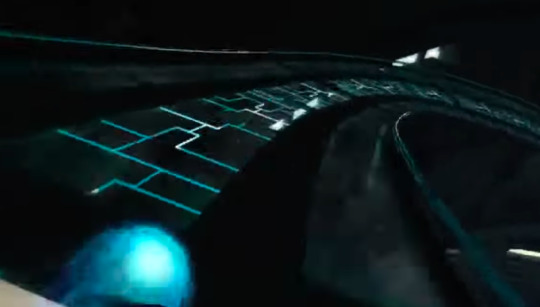
Sky Sanctuary’s more technological side is best seen inside the ruins. Revealed there are lots of glowing, geometric, cyan lights.
Now, where have we seen that before?

Usually, Silver’s futuristic design is attributed to him being, well, from the future. But what makes things “look” futuristic? Appearing more technologically advanced than the present. Now, is there anything about the future in Sonic 06 that screams “technologically advanced”? Everything is in ruins. It’s an apocalyptic world.
Which time seems more advanced than Sonic’s present? The past, or the future? Which time does Silver’s design most belong to?
Being from the past also better explains Silver’s powers. Technology and magic were better understood back then. If people can wield powers in Sonic’s world, the past is the time period it would be most common. And isn’t it unique how Silver and Blaze are the only two characters who consistently wield powers without the aid of technology or magical gemstones/items?
If you want a more direct comparison of Sky Sanctuary’s technological motifs next to Silver, here’s something I whipped up:

That’s all the support I have for Silver being from the past. Him originating from the past isn’t required for this theory to work, I just prefer it cuz it dovetails nicely into the whole theme SEGA has going for them. And into the next thing I’m gonna talk about.
I like to imagine that Blaze and Silver knew each other when they lived in the distant past. But how, if they’re from two different dimensions?

Dimensions
Let’s talk about dimensions. Sonic’s world has several. Sonic’s dimension, the Sol Dimension, Maginaryworld, maybe the storybook games? And there’s probably others I’m forgetting.
I’d argue the Babylonians are from their own dimension too. If you don’t already know, Sonic Riders: Zero Gravity reveals that the Babylonians were aliens that got marooned on Sonic’s planet in the distant past. But if dimensions are a thing in the Sonic world, what’s more likely? That the Babylonians were considered aliens because they’re from outer space, or because they were from a different dimension?

Knowing the Sonic world has these dimensions, and that people of the past were much more advanced... What if they realized there were other dimensions? What if they began communicating with each other? Formed relationships and alliances?
A world where it’s commonplace to communicate with those outside your own dimension. This is a world where Silver and Blaze could know each other.
The only evidence I have to support this is the guardian structure. The first three dimensions I listed (Sonic’s world, the Sol Dimension, and Maginaryworld) all have their own guardian structure that started in ancient times and remain preserved to this day. What if the rulers of the past agreed to form this guardian structure to protect the magical items of the worlds, and to also preserve the autonomy of their individual dimensions?

Final premise
I’ll conclude this with a premise that resulted from my imagination running wild with this. If you like this theory, feel free to explore your own ideas! _____________
It’s the distant past. Thousands of years before Sonic’s time.
There are many dimensions. And within them, civilizations. Some more are advanced than others. Those with the technology to detect their neighboring dimensions have formed loose alliances with one another. This encourages cooperation between dimensions and is especially helpful when threats appear within or between dimensions.
In this era, there lives a princess named Blaze the Cat. She’s an inhabitant of the Sol Dimension, and Guardian of the Sol Emeralds. Her high position naturally involves her in interdimensional affairs.
Blaze is called to help investigate a problem shared between her dimension and the dimension famous for its Chaos Emeralds. While there, she meets a hedgehog named Silver (or already knew him beforehand). The further she progresses her investigation, the more serious the problem proves to be.
This is nothing we’ve seen before. Our worlds are in danger!
- A line I could imagine Blaze telling Silver
Perhaps it’s the first manifestations of the doom that will later be brought upon their worlds. Or maybe it’s one of the series’ godlike beings--Solaris, Time Eater, Dark Gaia, etc. Or maybe someone, or something, is meddling with powers they shouldn’t.
Eventually, Blaze and Silver face a final culmination of this problem. An event that either sucks them into time and space, or presents such danger to their lives that the Sol Emeralds pull them into time and space to protect them. Either way, they are ripped from their current time and thrown far, far into the future.
And they are never heard from again.
124 notes
·
View notes
Note
Glad that you don't. There are so many people around here who actively participate and support such harmful behavior of conspiracy theorists. So many who defend it and so many who attack those who are calling these people out. It is eye-opening.
Ok! In the attacking game, however, we all lose because anyone attacks anyone. I, who am nobody, have received vulgar insults from people who check # of Eleanor Calder and # Briana (I don't remember the surname) You find this healthy? Checking a hashtag and insulting unfamiliar and uneducated strangers - I grant it - for two people you don't know? Is this not toxic? I read the worst filth about Zayn & Harry and Harry & Niall with "documented evidence" on YouTube - Tumblr - Instagram - Twitter .. Why does no one ever put them in the dock??
I had to mute Bottom!Louis on Twitter because I following a lot of Zouis writing monstrous things (which for a girl they would never write, but they are male and so it's okay) Why isn't anyone's priority to defend Louis' heterosexuality with these people? Believe me, perhaps, they are less numerous but they are very noisy. Why is only Larries a cult or a conspiracy theory? I have quarreled with many Elounors who consider Louis a man without a backbone and without ambition, who makes music as a hobby because his only aspiration is to marry Eleanor despite Louis himself has told us hundreds of times about his passion and determination, why these people can without nobody says A? many of their update accounts behave in the same way as the much-criticized LarryUpdate, looking for foolish proof and passing it off as proof of immense love, why they can? Because the couple is official, that's okay but The proof is still silly and anyone in an adult relationship can confirm this to you.
it's eye-opening. please be careful though. Going from one extreme to the other is just as risky. None of us know anything, this has been ascertained, but it is true for everyone, nobody is custodians of the truth and the rush to think differently from them can become an obsession itself. Without offending anyone it really seems a personal thing towards these biglarries blogs so criticized. if i can't be your friend i become your enemy. If I can't create the connection I aspired to with you, I make war on you. I've only been here for five years but I think I've seen this happen at least twice and for what it's worth I don't write this to please anyone because none of the BigLarries follow me!!
but do you know what I think is the real problem of this fandom? The personality. the lack of personality to be precise. on both sides it seems that many people need guidance. If (insert BigLarrie) say something that THEY think many people automatically think that it is correct without thinking with their head, but on The other side is the same. everything MUST become the other way around. without doubt, without questions.
Isn't it toxic in the same way?
why is there this need to make people change their minds and shout louder than others "I'm right and you're wrong?"
can you answer me? why Louis and Harry and Eleanor and Briana and Olivia and Camille have been ignoring Larries since 2017, they might still say agayn “stop" and instead chose to ignore, why Fandom can't do this?
for example last episode. This shirt

common opinion is that it is a coincidence, neither he nor Eleanor hypothesized what would have been the very obvious reaction of Larries. after 10 years can we not ignore that we all knew what Larries would think and therefore also the two victims of the conspiracy? can we at least take this for certain? So if he still wanted to wear this because he wanted to, totally not interested in what people would think .. Exactly whose fight are you fighting if the main victims are living their life happily?

3 notes
·
View notes
Text
20.01.2021
Leo Bersani - Homos
Monique Witting
Judith Butler
Michael Warner
Andre Gide, Jean Genet, Proust
desire for the same and desire for the lack
anticommunitarian impulses they discover in homosexual desire
The Immoralist, Sodome et Gomorrhe, Funeral Rites
how desire for the same can free us from oppresive psychology of desire as lack (a psychology that grounds sociality in trauma and castration)
a salutary devalorizing of difference
difference not as a trauma to overcome (it nourishes antagonistic relations between the sexes), but rather as a nonthreatening supplement to sameness
"Once we agreed to be seen, we also agreed to be policed"
a traditional sanctification of state authority
The Archaeology of Late Antique 'Paganism' edited by Luke Lavan, Michael Mulryan
Constructing Postmodernism By Brian McHale
reading modernistically - paranoiacally
New Criticism, New Critical institutionalization of modernism
paranoid reading is assumed to be the appropriate norm of reading
then postmodernist texts appear which assume and anticipate paranoid reading-habits
they incorporate representations of (fictional) paranoid interpretations (conspiracy theories) or paranoid reading practices, or they thematise paranoia itself, reflecting, anticipating, perhaps pre-empting actual readers' paranoid readings.
La Jalousie, Pale Fire, The Crying of Lot 49, De Lillo Running Dog/The Names/Libra, The Name of the Rose and Foucault's Pendulum
"the idea is not to discover the secret, but to construct it"
no longer an epistemological quest, but an enterprise unconstrained by criteria of truth and evidence (world-building?)
an experiment in self-conscious world-making, a cosmological matter (novel-writing enterprise is one as well)
one projects (calls into being) an entity, anticipating a response
Masons, Illuminati, Rosicrucians, Gender-LGBT
"he declares that the league exists so that people will then create it"
St Anselm ontological proof of God's existence
confusing existence in thought with existence in reality
but: they project into reality the non-existent entities
inventing nonsenses, but the public will want to pursue them if they hear of them
"we've shown the necessity of the impossible"
"we invented a non-existent Plan, and they not only believed it was real but convicted themselves that they had been part of it for ages, or rather they identified fragments of their muddled mythology as moments of our Plan"
ontological side effects of world-making: the projected world has begun to contaminate the real world
there might come a time when the projected world will supplant the real world
Frederick Jameson: Postmodernism, or The Cultural Logic of Late Capitalism
symptomatic works and diagnostic works
reflections or expressions of late-capitalist social and economic relations
diagnostic works aspire to produce some image/figure/representation of the unrepresentably complex multinational world-system in which we live
Kevin Andrew Lynch was an American urban planner and author. He is known for his work on the perceptual form of urban environments and was an early proponent of mental mapping.
cognitive mapping
Conspiracy paranoia is a recurrent cultural phenomenon especially in American political life, with successive waves of anti-Masonism, anti-Catholicism, anti-Communism etc
Hypothesis: Whenever the complexity of the social-economic system outstrips our capacity to represent it to ourselves, conspiracy theory arises to fill the gap as the "poor person's cognitive mapping"
The recurrence of crises of cognitive mapping
responses to successive crises of society's self-imagining
"fossilized" attempts at the cognitive mapping (reminds me of Deleuze and geology - paranoic geology of the psyche?)
late-capitalist high-tech versions of conspiracy and the postmodernist resurgence of traditional conspiracy theories
Constructivism's basic epistemological principle is that all our cognitive operations, including (or especially) perception itself, are theory-dependent. This means, first of all, that data do not exist independently of a theory that constitutes them as data.
Granted the theory-dependency of "facts", it follows that faithfulness to objective "truth" cannot be a criterion for evaluating versions of reality (since the truth will have been produced by the version that is being evaluated by its faithfulness to the truth, and so on, circularly). The appropriate criteria for evaluation now are, for instance, the explicitness of the version, its intersubjective accessibility, its "empirical-mindedness", i.e. its aspiration to be as empirical as possible, where empiricism is not a method but a horizon to be approached only asymptotically; and above all, the adequacy of the version to its intended purpose. In other words, constructions, or what I have been calling versions of reality, are strategic in nature, that is, designed with particular purposes in view.
cities constructed, not given or found
or are they?
Parisian structuralist narratology - Barthes, Bremond, Genette, Greimas, Todorov
21.20.2020
I have been watching protest of the Women's Strike. On my phone, at my desk, at home, later from bed. I have been unable to attend due to my deteriorating mental health condition. How to describe the feeling and the atmosphere of this protest? I will juxtapose the following:
Hierarchy - Presence - Genital - Narrative - Metaphysics - Determinacy - Construction of a world-model - Ontological certainty [modernism]
Anarchy - Absence - Polymorphous - Anti-narrative - Irony - Indeterminacy - Deconstruction of a world-model - Ontological uncertainty [postmodernism]
What I saw leads me to believe that I should associate my perception of protests with the latter column.
A plot: events arranged in temporal sequence, a causal motivation for the sequence
modernism and postmodernism not as period styles, one of them current and the other outdated, more like alternative stylistic options between which contemporary writers are free to choose without that choice necessarily identifying them as either avant-garde or arriere-garde.
The dissolution of the library and the world
And then collecting the fragments (relics) of the burned library
What if the library does not burn, but is flooded?
What if it dissolves into a flood of meaningless text
An overflow of meanings leading to the ultimate loss of all meaning
An overabundance of points and places in the map causing the map to become illegible
Alain Robbe-Grillet: Instead of having to deal with a series of scenes which are connected by causal links, one has the impression that the same scene is constantly repeating itself, but with variations"
"narrative as a systematic application of the logical fallacy denounced by scholasticism under the formula post hoc, ergo propter hoc"
"a complex web of responses to and repetitions of earlier works, visual and textual, creative and critical" (isn't any text/work such a web?)
Gradiva - Novel by Wilhelm Jensen
Topologie d'un cite phantome Robber-Grillet
"a narrative which has abandoned any sense of progress and explores the past as a set of variations on a split and dispersed present"
Vigo-Atlantis on the connecting point of three continents-islands
it is inundated in never-stopping rain
Ruins of Warsaw after World War 2 turned into a closed-off monument and after the fall of communism, into a "tragedy-amusement park", somewhat like Westerplatte
a participant of the Warsaw Uprising and a young Jew-Robinson (a descendant of other Robinsons) who survived hiding in ruins until present time both emerge and react differently: the insurgent tries to kill tourists thinking they are Germans and is killed by security himself and the Robinson goes back to hiding, understanding that the world has experienced an apocalypse and a new world has emerged, in which there is no place for him.
22.01.2020
Właśnie przechodzę przez kolejny nawrót depresji, nie stać mnie na terapię, nie jestem w stanie z kimkolwiek rozmawiać, nienawidzę stanu, w którym jest moja skóra i ciało, za bardzo się wstydzę, by naprzykrzać się komukolwiek opowiadaniem o moich problemach, mam za mało pieniędzy, prawie nie mam pracy, nie mam dokąd uciec, nie mogę nawet wyjechać za granicę, rzuciłem studia po raz piąty w życiu i ignoruję te kilka osób, którym jeszcze choć trochę na mnie zależy.
2 notes
·
View notes